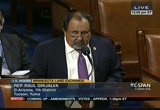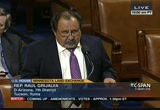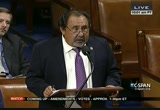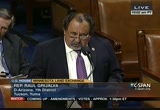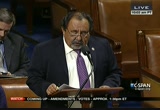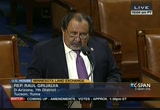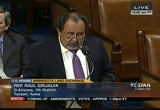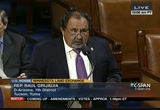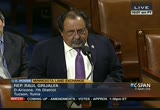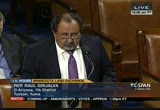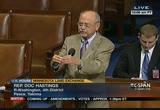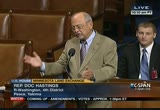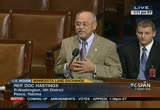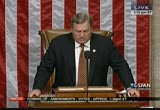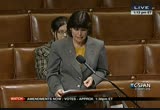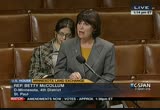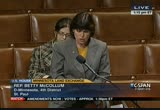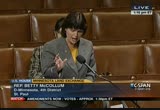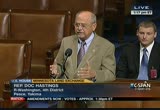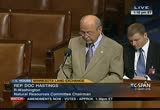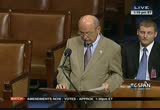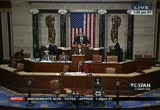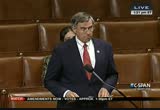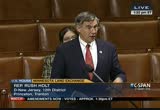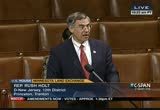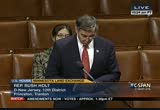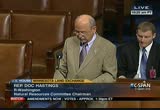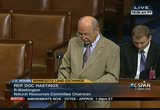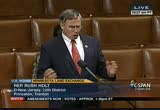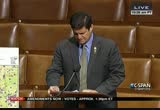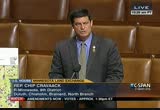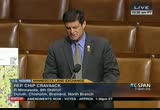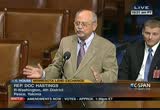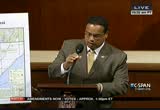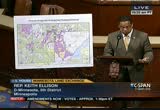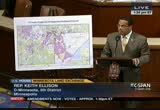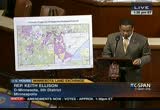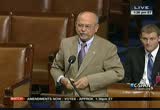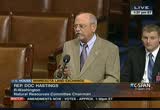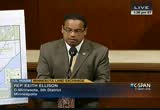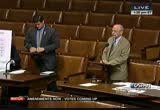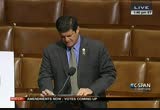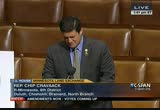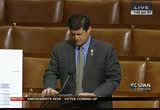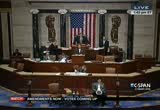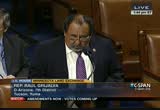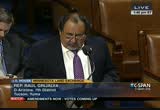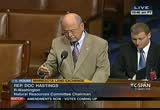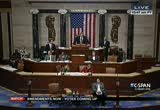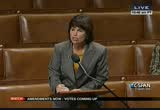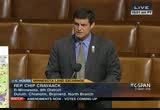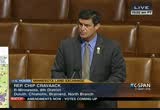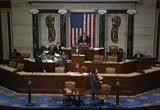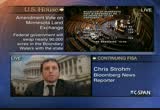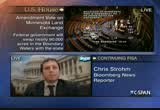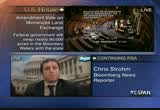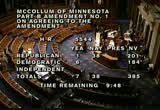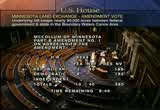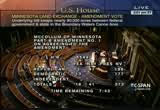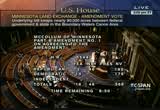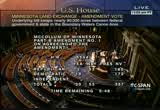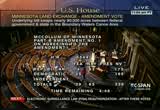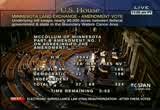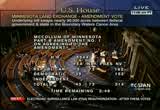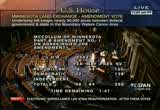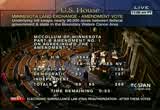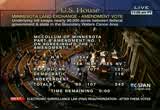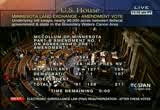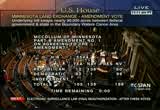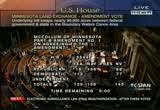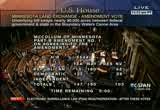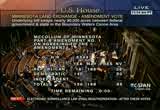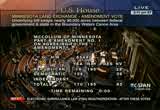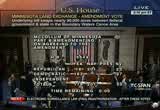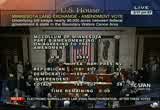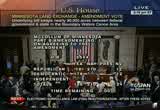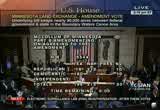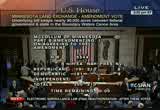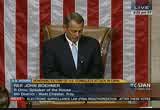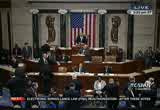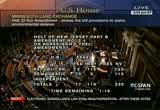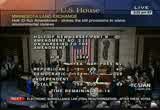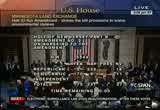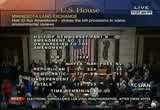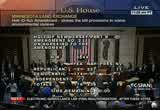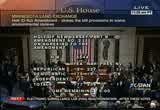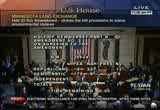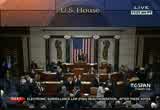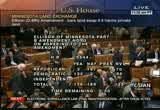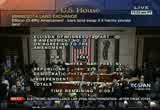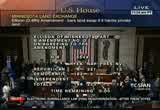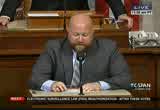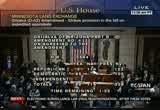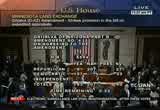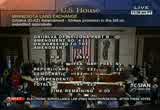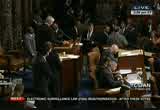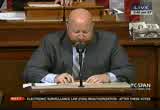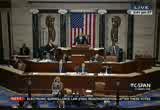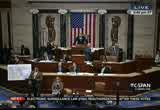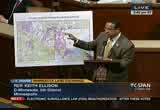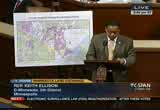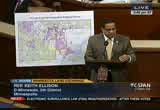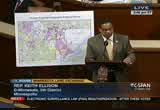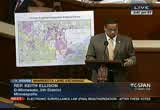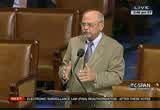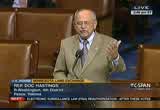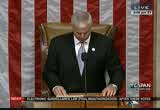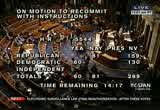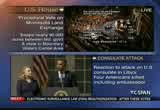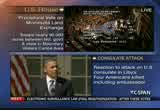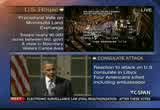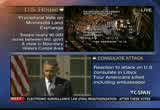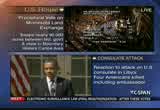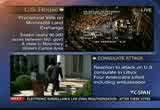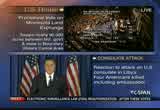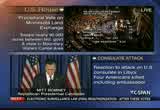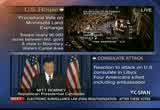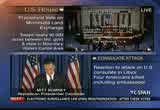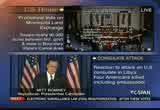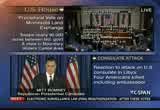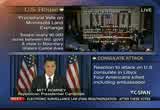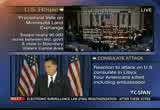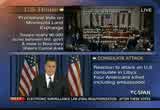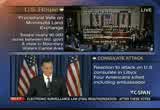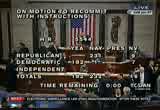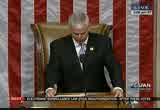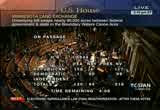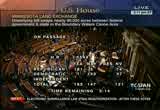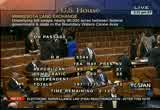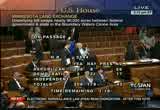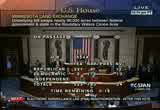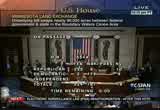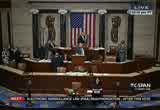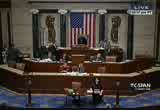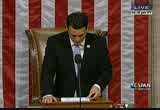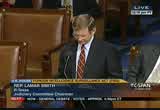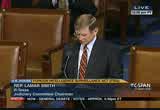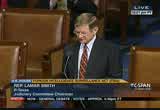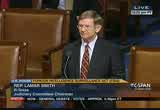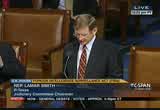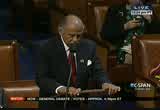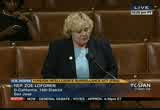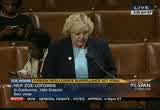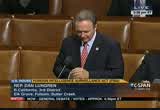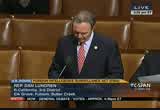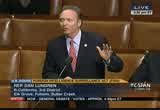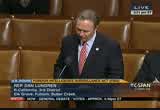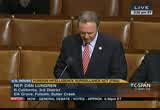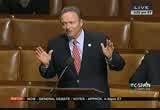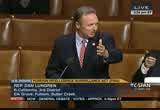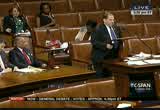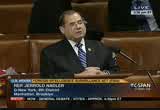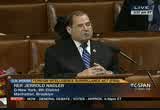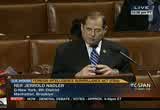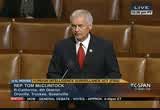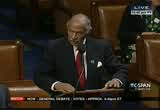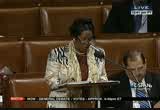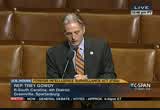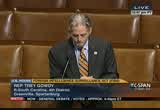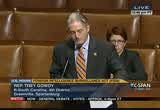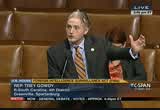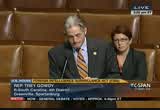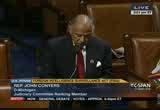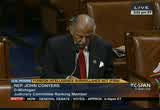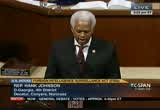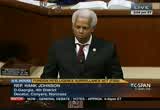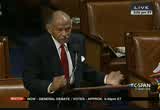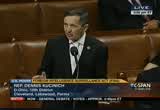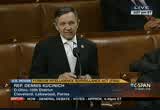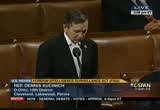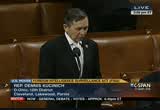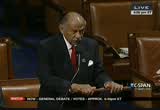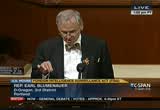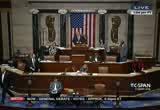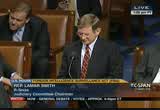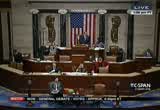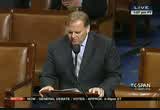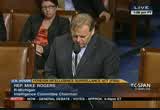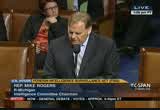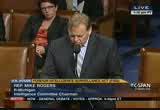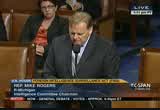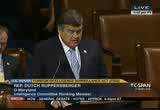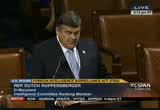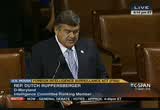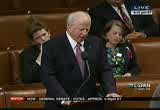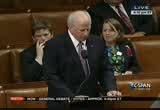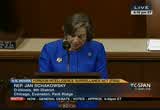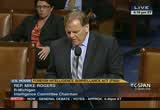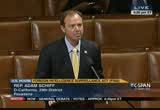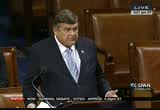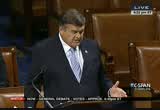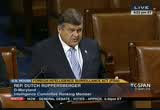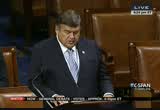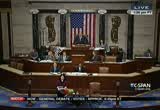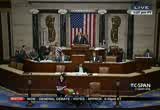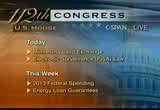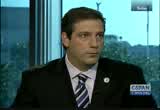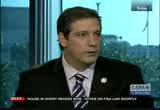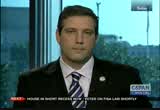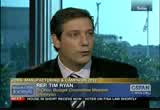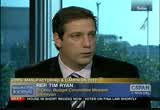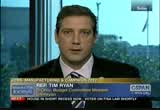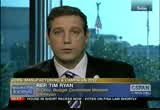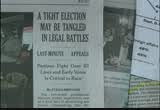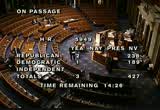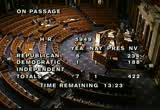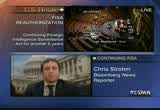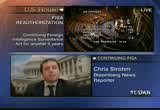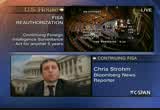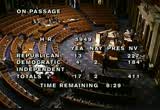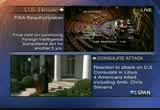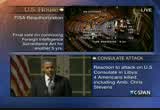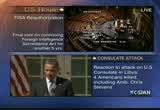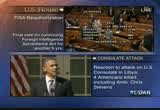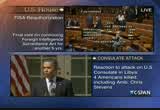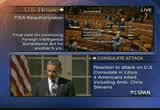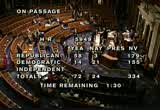tv U.S. House of Representatives CSPAN September 12, 2012 1:00pm-5:00pm EDT
1:00 pm
truman signed legislation into law to authorize the acquisition of private lands in what is now known as the boundary waters canoe area wilderness. the legislation was promoted as a way to protect important natural resource values from commercialization and to compen state cook, lake, and st. louis counties for the loss of property tax revenue. . during the legislative process, the congressman argued that county should receive 12 cents per acre of federal land for lost revenues. the truman administration argued the 12 cents per acre figure was excessive, negotiated compensation to .3% of fair market value which is the way the law was enactsed and stands today. each year since, these counties have received mandatory payments adjusted periodically to reflect increased property values.
1:01 pm
last year these payments totaled over $6 million. under the funding formula, under the funding formula, more federal lands mean more federal money. be a sent the hastings amendment -- absent the hastings amendment, lake, cook and st. louis counties, all within the sponsor of this legislation's district, stood to receive another $1 million annually. we raised the questions regarding this payment from the time the bill was heard in subcommittee until the bill was reported to full committee. in fact, i sent letters to each county commissioner in these counties, trying to learn more about how these funds are used. i received two responses, both indicated they support the current formula and relied on these payments to compensate lost property tax revenue. if there's no objection i would like to enter both these letters into the record. the chair: without objection. mr. grijalva: thank you. surprisingly no one wants to
1:02 pm
talk about these payments because it would be considered earmarks. earmarks which the sponsor voted against supporting along with many other members of his caucus. i represent a district with a lot of federal lands. my counties get payments through secure rural schools, we have to fight like crazy to extend payments every time these bills come for re-authorization. yet today we have a bill that purports to be about education funding for minnesota kids. what kind of role models are we if we can't even have an educated conference about what federal money is currently going to minnesota? let's just look the at the arithmetic. the state was losing $650,000 annually from foregone revenues because the state trust lands were within the wilderness area. she supports the enactment of this legislation to make up for this revenue. yet because of the hastings amendment, this legislation
1:03 pm
actually takes $1 million in revenue away from the counties of lake, cook and st. louis. are we robbing peter to pay paul? that's the question and i reserve the balance of my time. the chair: the gentleman reserves the balance of his time. the gentleman's request to include the letters in the record will be handled under general leave. the gentleman from washington. mr. hastings: mr. chairman, i advise my friend that i am prepared to close if the gentleman will yield back his time, i'll be prepared to close. the chair: the gentleman from arizona. mr. grijalva: continue to reserve the balance of my time. we have no other people to talk. mr. hastings: mr. chairman, i have -- i am prepared to close if the gentleman is prepared to yield back. the chair: the gentleman from arizona. mr. grijalva: thank you, mr. chairman. among the many flaws in the legislation is a provision
1:04 pm
waiving compliance with the national environmental policy act of 1969, nepa. nepa has been under attack by the republicans for years. most famously former chairman led an effort before leaving congress. nepa stands for two very simple principles. the first is the federal government should think before it acts. and the second is that the federal government should listen to the american people before it acts. nepa does not dictate outcome, it requires federal agencies to gather information, consider alternatives, seek public input before taking action that would significantly impact the environment. waiving nepa means waiving educated decision making, waiving nepa means waiving transparency and waiving nepa means waiving the possibility that the american people should play a role in managing the natural resources which they own. in the case of h.r. 5544, waiving nepa means waiving any
1:05 pm
process for determining which federal lands will be given to the state, what lands will be traded away and how will they be chosen. apparently that information is to remain secret. will lands currently used for recreation or to protect water quality or to preserve critical habitat be traded to the state for logging and mining? we have no way to know. waiving nepa shrouds this land deal in secrecy and insulates it from any public input. why should any member of this house oppose allowing his or her constituents to have input in the management of federal natural resources? cutting out public input is undemocratic, unwise and unfair. now we have heard claims that nepa should be waived because it leads to so-called frivolous litigation. of course frivolous is often in the eye of the beholder. the fact that nepa is more than 40 years old, its regulations are flexible and well settled and nepa litigation is fairly
1:06 pm
rare. what's more, timber companies, cattlemen, mining companies and other industry plaintiffs file nepa litigation just as often if not more than environmental groups. we have also -- we are also told that nepa causes too much delay. this accusation is also unfounded. nepa regulations allow for agreed upon-en -- greed-upon -- agreed-upon time limits. instances where nepa processes appear to drag on is often the result of an applicant that fails to provide necessary information in a timely fashion or changes the parameters of the project midstream. these anti-nepa claims are not based in fact and they're a smoke screen. a smoke screen designed to hide the fact that the real goals of exempting this land deal from nepa is to shield this exchange from public scrutiny. later today mr. holt will have an amendment to restore nepa compliance for this land deal
1:07 pm
and that amendment should be approved. a vote for nepa is a vote for the idea that the average american might have something valuable to say about the management of his natural resources. a vote for the bill without nepa is a vote to shroud this deal in darkness so that its potential impacts on habitat, water quality or recreation remain hidden from public view. mr. chairman, i reserve my time. the chair: does javement the gentleman reserve his time or does the gentleman yield back? does the gentleman reserve his time or -- mr. grijalva: reserve the balance of my time. the chair: the gentleman reserves the balance of his time. the gentleman from washington. mr. hastings: i'll advise my friend, i'm prepared to close if he'll yield back. the chair: the gentleman from arizona. mr. grijalva: this is -- i will close at this point. this debate quite honestly, mr. chairman, makes me feel like i'm living in an alternative reality. a reality where the protections of god's bounty on this earth is
1:08 pm
nothing more than an opportunity cost for local governments. a reality where we think it's perfectly acceptable to fund our children's education by stealing from the natural resource legacy our forefathers sought to protect. a reality where $650,000 for st. paul is more important than $1 million going to counties most impacted by this exchange. a reality where the basic ability for people to be informed by government actions and to voice their views is blocked by a party that prides itself on the idea of liberty. i don't know about you, but this is not the reality that i want to live in. we should have brought this bill to the floor, we could have brought this bill to the floor today with strong bipartisan support and resolved the real issue of isolated state lands within the boundary waters. just like the minnesota legislature did. instead it is groundhog day where anti-wilderness and anti-government philosophies are maxed -- masked as a concern for
1:09 pm
education funding when the arithmetic doesn't actually support the argument. this is a disappointment. this bill is bad for forests, bad for wildlife, bad for the american public and should be rejected. and i yield back the balance of my time. the chair: the gentleman yields back the balance of his time. the gentleman from washington. mr. hastings: mr. chairman, i yield myself the balance of the time. the chair: the gentleman is recognized. mr. hastings: thank you, mr. chairman. mr. chairman, i am sitting here absolutely amazed by the debate on this issue. this is really very, very simple. in 1978 there is no boundary canoe -- water canoe area wilderness. so there's trust lands in that part of minnesota that was generating revenue for public schools in minnesota. so in 1978 congress passed the boundary water canoe area wilderness. and they took that land out of
1:10 pm
trust. so that means there is a deficiency in trust lands for minnesota schools. this legislation simply seeks to correct that. nothing more than that. nothing more than that. so, in fact, here's another way to put it, mr. chairman. if the boundary water canoe area wilderness had not been passed we wouldn't be here today. beuse you would have those trust lands generating revenue. but because it included that area, we are here today. now, i heard my good friend from st. paul talking about the transparency and everybody should be involved in decision making. what happened in 1978 when this 86,000 acres were taken out of trust? where was the transparency? where was the goodwill that was coming from the federal government to the citizens of minnesota at that time? it apparently wasn't there. now, i know the forest service
1:11 pm
has -- you know, they can make those adjustments, they don't need an act of congress to do it. but, mr. chairman, it's been 34 years. don't you think after 34 years, if the ability was there, that it would be done if there was a will on both sides to do so? apparently there might have been a will on both sides but there are others that were vovened and said no, let's -- involved that said, no, let's slow the process down. so the minnesota legislature said, let's get this thing going. and they passed legislation and this simply carries out the act of the legislature that was signed by the governor. and it's really nothing more than that. i'm absolutely amazed by how the detail goes on. because what comes out of all of this debate from my point of view, which ironically comes from members that represent minnesota, is they don't trust minnesotans to make the right decisions as to what part of that national forest, you know, would be used for trust lands. i find that mind boggling.
1:12 pm
i think the gentleman from northern minnesota is doing right by his constituents with this legislation. to correct what has happened 34 years ago. so this is a good piece of legislation, mr. chairman. i urge its adoption and i yield back the balance of my time. the chair: the gentleman yields back the balance of his time. all time for general debate has expired. pursuant to the rule, the bill shall be considered for amendment under the five-minute rule. in lieu of the amendment in the nature of a substitute recommended by the committee on natural resources, printed in the bill, an amendment in the nature of a substitute consisting of the text of rules committee print 112-30, modified by the amendment printed in part a of house report 112-660, is adopted. the bill as amended shall be considered as the original bill for the purpose of further amendment under the five-minute rule and is considered read. no further amendment to the bill as amended shall be in order except those printed in part b of house report 112-660.
1:13 pm
such further amendment may be offered only in the order printed in the report by a member designated in the report, shall be considered read, shall be debatable for the time specified in the report, equally divided and controlled by a proponent and opponent, shall not be subject to an amendment and shall not be subject to a demand for division of the question. it is now in order to consider amendment number 1 printed in part b of house report 112-660. for what purpose does the gentlewoman from minnesota seek recognition? ms. mccollum: mr. chairman, i have an amendment at the desk. the clerk: amendment number 1 printed in part b of house report 112-660 offered by ms. mccollum of minnesota. the chair: pursuant to house resolution 773, the gentlewoman from minnesota, ms. mccollum, and a member opposed each will control five minutes. the chair recognizes the gentlewoman from minnesota. ms. mccollum: as you've already heard here today, h.r. 5545 is missing an awful lot of important details and taxpayer protections. one major admission in this bill
1:14 pm
is the failure to acknowledge the treaty rights of minnesota's tribal nations. treaty rights are predominant concern in this land exchange because unspecified lands are under consideration in h.r. 5544, because we don't have a map. they're all within the superior national forest which is governed by the 1854 treaty between the chip with a nation and the united states -- chipewa nation and the united states government. it guaranteed that tribal nations can continue to fish, hunt and gather and otherwise use the land to support their way of life. however, in its current form this bill completely ignores the treaty rights of tribal nations. the minnesota process is moving forward in the state of minnesota includes the tribal nations. we need to make sure that the fond du lac band of lake superior chippewa, the grand portage band of lake chippewa, have their treaty obligations
1:15 pm
protected and met by the united states government. the tribal council of grand portage of chippewa has contacted my office to express their great opposition to this bill. the chairwoman of the fond du lac band of chippewa has sent letters in opposition to the governor, the secretary of agriculture, and to senators and representatives. at the appropriate time i have a copy of that letter to submit to the record. the chair: request the will be covered by general leave. ms. mccollum: thank you. minnesota tribes foresee a negative impact of this bill on their guaranteed free rights for use of their land because they are not being considered as part of the process under the cravaack bill. the quote from chairwoman driver's letter is, quote, we oppose the minnesota education, investment and employment act until suitable tribal consultation has occurred. chairwoman also disagrees with the conclusion that the exchange of more than 86,000 acres
1:16 pm
without government to government consultation, quote, shall not be considered to be major federal action. it's hard to see how anyone could consider the exchange of land that is being governed by a federal treaty with sovereign tribal nations to be anything less than a major federal action. the amendment that i'm introducing would recognize and reserve fishing, hunting and gathering ribets of the tribe and lands under -- rights of the tribe and lands under any consideration. it would have legal representation from the three impacted tribes and from impact from the great lakes indian fish and wildlife commission. this amendment will not solve the fundamental problems of this bill but it is an effort to respond to the threat against tribal interests and tribal sovereignty that this bill contains. this bill does not change the fact that minnesota now sees the federal government in a
1:17 pm
jump-start effort to establish a process for minnesota on how to handle the finishing touches to the land transfer. well, i believe at least the tribal voices should be at the table to be heard. so, mr. chair, i do not believe that h.r. 5544 should be moved forward. i will be voting against the bill. i want to be clear about that. however, this unnecessary, unclear bill is to proceed, at least at a minimum we should protect our u.s. government-to-government treaty rights in any land exchange. mr. chair, i yield back. the chair: the gentlelady yields back. who claims time in opposition? the gentleman from washington. mr. hastings: i rise in opposition to the amendment. the chair: the gentleman is recognized. mr. hastings: i yield myself such time as i may consume. the chair: the gentleman is recognized. mr. hastings: thank you, mr. chairman. i respect the gentlelady's concern for native americans. as a matter of fact, i will simply say that's one of the reasons when i became chairman of the natural resources committee that we had a subcommittee dealing with their
1:18 pm
issues because i think they were being neglected in the past. so i share that concern. but this amendment honestly is really not necessary. and i have to say this, mr. chairman, at this very last minute as we're debating this on the nor it has raised an issue that has not previously been risen. let me just go back, the history of this legislation. this issue was not raised at any point during the subcommittee hearing or the full committee markup of this legislation. nor was this issue mentioned in the descending views that was filed by the minority in their bill report. nor was this issue raised by the gentlelady from minnesota's detailed letter opposing this letter that was dated on july 24. so i don't know why it's coming up now when it was not previously raised in the legislative process. but, mr. chairman, i can see very clearly that the federal government has a duty to uphold
1:19 pm
treaty obligations and trust responsibilities to indian tribes. these will be upheld and they are not changed by this bill. there are inherent obligations that the federal government has to the indian tribes and they need to be respected. this amendment is not necessary and as written may raise complex questions whether the amendment itself would alter the treaty obligations of the chippewa. the original treaty with the chippewa of 1854 referred specifically to fishing and hunting rights. this amendment would add the phrase "gathering" to those rights without any definition of scope of what that means. lastly, i will credit the members -- the gentlelady who's sponsoring this legislation, she said last night in the rules committee and a moment ago that notwithstanding whether this amendment would pass or not she would be opposing the bill. i take her at her word on that,
1:20 pm
but this is a last-minute issue that had not been raised. it's not necessary to respect and uphold -- for us to respect and uphold the rights of tribes. and i think it's being offered, as was stated by somebody that's simply opposed to the bill. for these reasons i urge my colleagues to oppose the amendment, and i understand the gentlelady has yielded back, i yield back my time and urge a no vote on the amendment. the chair: the question occurs on the amendment offered by the gentlewoman from minnesota. all those in favor say aye. all those opposed, no. in the opinion of the chair, the noes have it. ms. mccollum: mr. chairman, i would like a recorded vote on this amendment, please. the chair: pursuant to clause 6 of rule 18, further proceedings on the amendment offered by the gentlelady from minnesota will be postponed. it is now in order to consider amendment number 2 printed in part b of house report 112-660. for what purpose does the gentleman from new jersey seek recognition? mr. holt: i have an amendment at the desk.
1:21 pm
the chair: the clerk will report the amendment. the clerk: amendment number 2 printed in part b of house report 112-660. the chair: pursuant to the rule, the gentleman from new jersey, mr. holt, and a member opposed, each will control five minutes. the chair recognizes the gentleman from new jersey. mr. holt: this bill tells the american taxpayers to take a hike. not to take a walk in the woods, but give up your place in any decisionmaking. get lost. a hike from democracy and engagement in our government. because h.r. 5544 has a provision that would bar all americans, including native americans, from being provided the information about the land exchange to take place and would bar them from participating in the democratic process to voice their views
1:22 pm
about the disposition of their property. my amendment would restore public participation in the development of this proposed land exchange by striking language that would subvert proper environmental review under the national environmental policy act, nepa. h.r. 5544 continues what we have seen elsewhere on this floor and in the resources committee that can only be called an attack on nepa. i wonder what my colleagues have in mind, why they have such a strong knee jerk reaction to this bipartisan initiative that was signed into law by president nixon, you may recall. whatever any of my colleagues may think about the
1:23 pm
adviseability of the bill, the underlying bill and the exchange that is proposed here, whatever exchange that may be, i would think my colleagues would at least one this to be done with transparency, full knowledge and public participation. public participation should always be of the utmost concern when planning public land projects. but is particularly critical for the exchange that is proposed here. we are not talking about a small land exchange. we are talking about tens of thousands of federal acres that will be going out of federal ownership and into state ownership for the purposes of mining and logging. the bill doesn't tell us which parcels will be exchanged. we have no map. we really have no idea. we do know that there are 700 miles of snowmobile trails within superior national forest, that there are thousands of lakes, 77 points
1:24 pm
of lake access, 13 fishing piers. we know hunting is allowed on all these lands including land within the boundary waters. we also know that 25 groups, no fewer than 25 groups have written in opposition to this exchange expressing concerns about their ability to participate in what should be a public process. we also know that two million hunters, anglers represented by the minnesota back country hunters and anglers association oppose this bill because, in their words, hunters have a vested interest because we now have access to these properties, something that's never guaranteed when management began switching hands, end quote. finally, we know why the state of minnesota wants these federal lands. they want the lands to generate receipts for their school trust through mining and logging. so we know some things, but
1:25 pm
there's much we don't know. there's much that should be brought out to the public. this entire exchange is justified on the state's belief that it is losing $665,000 a year because it can't mine and log lands within the boundary waters canoe wilderness area. the public deserves to know more about this exchange and to have a voice in the future of these lands. i urge my colleagues to support my amendment which would ensure that the public can play a role in this exchange if the exchange is to go forward. i reserve the balance of my time. the chair: the gentleman reserves the balance of his time. the gentleman from washington. mr. hastings: mr. chairman, i rise in opposition to the amendment. the chair: the gentleman is recognized for five minutes. mr. hastings: i yield myself two minutes. the chair: the gentleman is recognized. mr. hastings: this amendment would undermine the purpose of the bill by allowing a cabinet secretary or even a low-level federal bureaucrat the authority to override an act of congress and delay this land exchange. let's be specific. this bill directs a land --
1:26 pm
state lands for federal forest lands, the simple result of the exchange will be that the boundaries would be state rather than federal. management of lands exchanged to minnesota will continue to be responsible under united states law. now, mr. chairman, under the u.s. constitution it is the legislative branch of government that writes our nation's laws. it's the responsibility of the executive branch to execute the laws written by congress. this amendment would result in giving the executive branch the ability to undermine or ignore written law. this law exchange would be subjected to years of costly red tape and bureaucratic foot dragging. as a matter of fact, mr. chairman, that's been going on for 44 years. that's why we are here today. the prirmente of the gentleman from minnesota's bill -- the priority of the gentleman from minnesota's bill is -- it seems like the amendment offered by the gentleman from new jersey
1:27 pm
is more federal red tape to protect federal bureaucracy and lawsuits. so i urge no to the amendment and i reserve the balance of my time. the chair: the gentleman reserves the balance of his time. the gentleman from new jersey. mr. holt: the chairman must think that it is so inconvenient to deal with a pesky public. i -- you know, whether this is connelly mandated or comes about in any way, something of this scale, involving the public's land should involve the public in a very open way in understanding what it will be and in carrying it out. that's all this says. that's all this amendment would do, would allow the nepa process, the environmental process that applies to so many
1:28 pm
things around this country to apply to this important transaction. i reserve the balance of my time. the chair: the gentleman's time has expired. the gentleman from washington. mr. hastings: mr. chairman, i'm very pleased to yield three minutes to the sponsor of this legislation, mr. cravaack. the chair: the gentleman is recognized for three minutes. mr. cravaack: mr. speaker, i rise in opposition to this amendment. the secretary already has the authority that the amendment is supposed to possess. that's what got us here in the first place. this amendment would undermine the purpose of the bill by giving the secretary the option to continue the delaying and obstructing a land exchange with the state of minnesota. this is an issue that minnesota and the federal government have been working on for over three decades under existing authorities. this amendment would only continue the status quo, so i must oppose it. stalling the process further helps no one, least of which the schoolchildren and teachers
1:29 pm
of minnesota. mr. speaker, we've had public input for over 30 years and that has culminated in the bipartisan state senate file 1750 that was passed earlier this year by an overwhelming bipartisan vote in the state legislature and signed by democrat governor mark deyton. the public has spoken. the bill has support of the people of the eighth district of minnesota and would execute a bipartisan plan passed by the minnesota legislature, signed by the governor. the only groups that oppose this bill is fringe groups, many of those being from out of state. this amendment would give the environmental free rein to sue the federal government and have other than fees paid for by the taxpayers of the united states. i urge my colleagues to oppose this amendment. in addition, we heard a couple times today, where's the map? well, here it is. here's the map. h.r. 5544 no longer contains a direct reference to the forest service map because h.r. 5544 is executing a state bill.
1:30 pm
state file 1750, which does specify lands to be exchanged in section 4 of the bill. subsection 3, exchange of the state land shall give priority to the exchanges that provide the most opportunity for revenue generation for the permanent school fund and priorities shall be given to lands within the superior national forest and the purchase unit in the st. louis county and the following townships of st. louis county. range 14 west. township 16 north, range 13 west. an township 60 north, range 12 west. they have maps of this land. the forest service has maps of these land. actually they're available online. the -- when the state passed the senate file 1750 we changed the references in the bill from the forest service map to the state's passed plan. the reason why h.r. 5544 doesn't specify lands is
1:31 pm
because it executes the state plan which does specify the lands. again, the maps are available from either the forest service of the minnesota department of natural resources. thank you, mr. speaker. and i yield back. ms. mccollum: sir, you said there is designated land on the other half of the exchange. i'm very well of the school trust land. can you show me a map? i know that the state talks about areas. can you show me a map? the chair: the gentleman's time has expired. the gentleman from washington has 30 seconds remaining. mr. hastings: i yield myself the 30 seconds. the chair: the gentleman is recognized for 30 seconds. mr. hastings: mr. chairman, i have to -- i hear the crocodile tears in this process. i remind my colleague that when this area was designated wilderness, nepa was not involved. now, once this land is -- the land trade is made, it is subject to minnesota environmental policy act.
1:32 pm
so there is a process in which this will be carried out. i don't support the amendment. i urge a no vote on the amendment and i yield back the balance of my time. the chair: the question is on the amendment offered by the gentleman from new jersey. those in favor say aye. those opposed, no. in the opinion of the chair, the noes have it. the gentleman from new jersey. mr. holt: i request a recorded vote. the chair: pursuant to clause 6 of rule 18, all proceedings will be postponed. it is now in order to consider amendment number 3 printed in part b of house report 112-660. for what purpose does the gentleman from minnesota seek recognition? mr. ellison: i have an amendment at the desk. the clerk: amendment number 3 printed in part b of house report 112-660 offered by mr. ellison of minnesota. the chair: pursuant to house resolution 773, the gentleman from minnesota, mr. ellison, and a member opposed each will control five minutes. the chair recognizes the gentleman from minnesota.
1:33 pm
mr. ellison: thank you, mr. chair. i rise to present an amendment that would require that as these exchanges go forward, that they would have to be done in a manner that does not hurt private property interests. there's no doubt that when the exchanges are affected, people in the forest areas who will acquire them will be looking to mine them and log them and things like that. but the fact remains that there are other legitimate private property interests there and these private property interests should be rected -- protected. the bill introduced by my colleague from minnesota, representative cravaack, has no protection for areas for high ecological and recreational value. risk the livelihood of small businesses that rely on the recreational tourists to survive and thrive ands remain the values of private property within the spear nor national forest. and the region depends upon $1.6 billion of revenue from outdoor recreation. we cannot risk our natural lands for the short-term gain of the
1:34 pm
mining industry. my amendment would simply ensure that no land would be exchanged if it would likely have a negative impact on private or small business interests. in this house we often hear it said we should not pick winners and losers. i agree with that. we shouldn't. and therefore this amendment, if adopted, would protect and ensure that no land would be exchanged if it would likely have a negative impact on the private property interests. mr. speaker, i'd like you to note that the white areas here are private property. as you can see, we're interspersed in the green. as land is transferred there and exchanged, there's a lot of private land next to the forest land and the private property interests are at risk and the bill dish mean, the amendment is if passed would protect them. many studies have found that private property and housing values decrease the closer they
1:35 pm
are to mines. just take it from the standpoint of a small bills. many small businesses depend upon protecting the natural resources in the area. sull fight mining being considered in this region can leave sull furyk acid into lakes and rivers, killing aquatic life and ruining someone's small business or fishing resort. it's generating specific public concern and deserves an open, transparent process of evaluation. mining has a role in the economy. in its right place. and with the right protections. but no one denies that it can harm the environment and small businesses if it is done in the wrong place, in the wrong manner. mr. speaker, let me just talk about jane. jane is the owner of the river point resort and outfitting company located in the superior national forest. and she's very concerned about the impact of this bill on her small business. she says the bill will be absolutely devastating to the tourism economy. she says her own town exists on
1:36 pm
tourism which depends on clean water and clean airplane she also says private property values in the area are already going down interest existing drilling. mining hurts small businesses like jane's that cater to the anglers, the paddlers, the hikers, the vacationers in the region. we need greater transparency. minnesota landowners and small businesses need to serve an open, transparent process, but that's not what we're getting. the state of minnesota has already created an open process to transfer state lands within the boundary waters. no federal legislation is required for this land exchange to take place. we should not be waiving environmental and public comment . at the very least, if we go forward with this miss guided bill, we should ensure that private property and small business is protected. i ask you to support the ellison amendment and oppose the bill from my colleague in minnesota. i reserve. the chair: the gentleman reserves the balance of his time. the gentleman from washington.
1:37 pm
mr. hastings: mr. chairman, i rise in opposition to the amendment. the chair: the gentleman is recognized for five minutes. mr. hastings: i yield myself a minute and a half. the chair: the gentleman is recognized. mr. hastings: mr. chairman, this amendment is unnecessary and it would allow the federal bureaucracy an automatic excuse to stop implementation of this bill when it becomes law. it would provide the forest service with vegas authority -- vague authority to delay or simply outright a block of -- outright block an act of congress. does that sound familiar? while presented as property right protection, the plain fact is that this bill only, only involves exchange of lands between state lands and state forest lands. so i want to be very, very clear. not one square inch of private property is included in this exchange. again, this is only state and federal lands. and i have to say, mr. chairman, on my committee, a lot of our discussion on a variety of issues talks about private property rights. and when we have debate on that and we have votes on amendments on those issues, i find it rather ironic that the party of
1:38 pm
the gentleman offering this amendment always tend to vote against those amendments that protect private property rights. once again, this amendment, the net result would be to give the federal bureaucracy a bill -- ability to slow down carrying out this act. with that i reserve the balance of my time. the chair: the gentleman reserves the balance of his time. the gentleman from minnesota. the gentleman has 11 fourts minutes remaining -- 1 1/4 minutes remaining. mr. ellison: i'll reserve. the chair: the gentleman reserves the balance of his time. the gentleman from washington. mr. hastings: i only have one other speakers and we have the right to close. so if the gentleman wants to use his time we'll -- the chair: the gentleman from minnesota. mr. ellison: certainly. the chair: the gentleman is recognized. mr. ellison: well, i appreciate the gentleman's reflection that the exchanges between state land and state land. but it's next to private property land. that's exactly the point of my amendment. that if i have a business or
1:39 pm
better yet not me, but jane, who does in fact have a business, that is next to a mine that is leeching hazardous material, it will negatively impact her business. this is not a dispute between public and private. it's a dispute between big private interests and smaller ones. we're here in congress to stand up for people who need a voice. i doubt these multinational mining interests need congress to stand up for them. but the janes who are running resorts in this forest do. and we're simply asking you to adopt an amendment that would will stand up for the private property rights of regular citizens who had a dream and fulfilled it. opening a resort, opening up ale shop, doing things -- up a tackle shop, doing things that are deeply rooted in minnesota's heritage. so i yield back. the chair: the gentleman yields back the balance of his time. the gentleman from washington. mr. hastings: mr. chairman, i'm pleased to yield the balance of the time again to the author of this legislation, mr. cravaack
1:40 pm
of minnesota. mr. cravaack: i thank the gentleman again for yielding. mr. speaker, because of the way this amendment is worded, i have concerns of the house affecting mining and timber jobs in the new lands. i would yield to the gentleman to explain how he thinks the amendment would affect jobs in the eighth district of minnesota concerning mining and lumber. mr. ellison: if i understand the gentleman's question correctly, i think that it will negatively impact jobs in the -- mr. cravaack: ok, reclaiming my time then. mr. speaker, i'd ask my colleague if he knows how much mining taxes contribute to the state of minnesota? i'll yield. mr. ellison: well, the point of my amendment is that this -- your bill is -- mr. cravaack: reclaiming my time. reclaiming my time. the house is out of order, mr. speaker. mr. speaker, as you can see from the most recent mining tax guide from the state of minnesota, the
1:41 pm
eighth district of minnesota contributes $79.1 million to the state of minnesota. and that is just not inclusive of the income related to taxes from jobs from the minings that will go on in the state of minnesota. is the gentleman opposed to mining or -- in minnesota? can you give me an example of how he has supported mining? i yield. mr. ellison: if the gentleman will let me answer i'll be happy to answer you. mr. cravaack: i'll give you 15 seconds. mr. ellison: thank you. i appreciate that. mr. cravaack: you're welcome. mr. ellison: what you're doing is trying to say that you're going to stand up for the big money people as opposed to the cumulative small business people. i think if you put the number of small business people together your big multinational mining interests that are going to pollute their businesses -- mr. cravaack: reclaiming my time. mr. speaker, i'd ask my colleague, i'm going to tell my colleague how much mining and timber contribute to the school trust fund yield. mr. speaker, in the most recent
1:42 pm
school trust fund report, mining and timber contributed $23.17 million in 2011. now, maybe that's not -- doesn't sound like much here inside the beltway but that's a lot of money where i come from. does the gentleman think that schools in minneapolis are adequately funded? i'll answer that for you. probably not. because the public school it's just went to four days which are live and we have 40 kids in a classroom. i think our teachers and kids could use the extra funding. also i'm very interested right now that now that the gentleman is very concerned about small interests in the rural communities. i find that very enlightening. i'd like to yield to the gentleman if he can tell me how a small business would be affected by land exchange and -- hamper job creation? mr. ellison: i'll tell you this about less than 1% of money for schools comes from trust lands. it's a very tiny percentage. so we're going to sacrifice our heritage for a multinational mining company. mr. cravaack: reclaiming my time. obviously the gentleman from minnesota does not think any
1:43 pm
money going into the school trust fund is beneficial. decisions such as these should not be made by washington bureaucrats in d.c. they should be made by minnesotans. and that is how we got into this mess in the first place. the bill merely executes a bipartisan state plan signed by the governor, state senate file 1750. we cannot trust washington political appointees with the power to derail land exchange in the expense of minnesota school children and their teachers. i urge my colleagues to oppose this amendment and i yield back. the chair: the gentleman from washington. mr. hastings: i yield back the balance of my time. the chair: the question occurs on the amendment offered by the gentleman from minnesota. those in favor say aye. those opposed, no. in the opinion of the chair, not have it. mr. ellison: i ask for a recorded vote. the chair: pursuant to clause 6 of rule 18, further proceedings on the amendment offered by the gentleman from minnesota will be postponed. it is now in order to consider amendment number 4 printed in part b of house report 112-660. for what purpose does the gentleman from arizona seek recognition? mr. grijalva: thank you, mr. chairman. i have an amendment at the desk. the chair: the clerk will designate the amendment. the clerk: amendment number 4
1:44 pm
printed in house report 112-660 offered by mr. grijalva of arizona. the chair: pursuant to house resolution 773, the gentleman from arizona, mr. >> i hallucinate varks and a member opposed each -- mr. grijalva and a member opposed will each control five minutes. mr. grijalva: thank you. the amendment i'm offering ensures that this land trade is fair and protects the american taxpayers. for every land exchange undertaken by the forest service, the bureau of land management, park service or fish and wildlife service, land managers must ensure taxpayer assets are protected by requiring the land appraisals based on accepted federal standards. this house has considered six different land exchange bills in this congress. each and every one of them required standard appraisals for those lands and they all passed. but today we have a bill that defers to legislation passed by the state of minnesota to control the examination and the value determination of federal lands. this is not how we treat federal
1:45 pm
assets. whether a land exchange is undertaken through an administrative process or through legislation, we require a standard appraisal and the equalization of payments of the value of lands considered for exchange are not equal. surely we can provide better protections for the taxpayers of this country. the last estimate, and i will stress estimate, of the value of the land in question was nearly $100 million. do we really want to abandon our responsibility as stewards to federal taxpayers and waive fair appraisal standards? surely we can hold congressman cravaack's legislation to the same bar and standard we required of congressman herger, congressman gosar, congresswoman tsongas, congressman amodei's bill, andy, yes, my own bill. i understand a lot of members on the other side of the aisle would happily turn over federal lands to the states.
1:46 pm
in fact, that position is reflected in their parties a platform. but this isn't what we're voting on today. today we are voting on a land deal that shouldn't turn the taxpayer interests upside down. i would urge support of my amendment and i reserve the balance of my time. the chair: the gentleman reserves the balance of his time. the gentleman from washington. mr. hastings: i rise in opposition to the amendment. the chair: the gentleman is recognized for five minutes. mr. hastings: i yield myself two minutes. the chair: the gentleman is recognized. mr. hastings: mr. chairman, the purpose of this bill is to ensure a fair exchange of lands on state and federal areas and there are protections that were put in specifically in the bill . of course, the big protection is that the secretary of agriculture, who is a federal representative in this process, has to agree. you got two parties that have to agree and one of them's federal. now, what can be more protection than that? now, let me go back main. we seem to have to talk about
1:47 pm
the history of this. the valuation of the land in 1978 when this wilderness area was developed, i wasn't here. nobody here on the floor debating this was here at the time. but i doubt if there was a valuation that was given to minnesota at that time. and now they want to come back and say, ok, we have to have a precise valuation on the federal level. come on. this corrects something that was not done in 1978. this amendment simply slows down the process, which i might add, mr. chairman, that seems to be what the process is with all four amendments that were taken up today. slow down the process. 34 years. isn't that long enough? this is not a good amendment, i urge rejection of it and i reserve the balance of my time. the chair: the gentleman from arizona. mr. grijalva: i yield the remaining time to the gentlelady from minnesota, ms. mccollum. the chair: the gentlelady from
1:48 pm
minnesota is recognized for three minutes. ms. mccollum: i thank mr. grijalva. this is not about slowing down the process. and i know it's not the intention of the members on the other side to assume my motivation. i know it's not their intention. this and the amendments that i offered is because there is a process in place in minnesota that allows for people to be at the table, for tribes to be at the table to follow a regular order, to have an appraisal like everyone else had, to have a map on the floor and not start creating a wave of federal legislation that to my, to my knowledge no one has asked for this legislation to have a vote on the floor today. there is no senate companion. there is no urgency. there is no emergency. the state of minnesota has a process in place, and i will say as a state legislator, yes,
1:49 pm
there were times i didn't think we needed to move forward with the land exchange. but the northern legislators convinced overwhelmingly with the governor of minnesota that this land exchange needs to take place and it should take place and i am not trying to slow it down. i am trying to take this bad legislation and put it aside and let the good legislation and let the regular order that the state of minnesota has established in order to have these lands exchanged move forward. that is my motivation. good legislation. not for the first time on the history of the floor of this house, passing a land exchange without a map. and for the first time that i heard, not use the regular federal standard appraisal process. it sets a bad precedence. and i'm not sure people are out to do wrong by the schoolchildren of minnesota. my student attended k through
1:50 pm
higher ed in minnesota. i know how strapped we are for cash. i do believe there will be very slight amounts of dollars that will go back in the school trust. but you know, that's going to happen whether we take this bad vote on this bad bill today or not. the schoolchildren in minnesota will be served. this land will be exchanged. the question for this congress is, do we do it the right way, do we do it the wrong way, do we set a bad precedence for future land exchanges bills or do we make sure that we allow a fair, open, transparent process that started in minnesota, finishes in minnesota? i yield back. the chair: the gentlelady yields back the balance of her time. the gentleman from washington. mr. hastings: mr. chairman, i will yield the balance of my time -- do i understand the time on the other side has expired? the chair: the gentlelady has yielded back the balance of her time. mr. hastings: does the gentleman from arizona still have time?
1:51 pm
the chair: no. the gentleman from arizona yielded the remaining time to the gentlewoman from minnesota and she yielded back the balance of her time. time has expired. mr. hastings: i know this is complicated. i am very pleased to yield the balance of the time, again, to the author of this legislation, mr. cravaack. the chair: the gentleman from minnesota is recognized for 3 1/2 minutes. mr. cravaack: i rise in opposition to this amendment. it delays the implementation of the overall bill. the valuation of the lands to be exchanged as required by minnesota state senate file 1750 requires that the lands not only be substantially equal in value but the valuation is done in a manner agreed to between the state commissioner and the authorized representative of the united states. in addition, subsection d of h.r. 5544 on page 4 requires the survey to be satisfactory to the secretary of agriculture. we have had 30 years of delay.
1:52 pm
30 years of appraisals. 30 years of map making. we don't need any more. the children of minnesota, these are their lands and they're entitled to them. mr. speaker, the state knows the land, what it's worth, just as well as the federal government. we can do it for lower cost, and since much of the work has already been done, the lands have been identified. here's the map. this section right here and this section right through there. this amendment is a stall tactic, quite frankly, to increase the administrative burden and increase the cost of the state. subsection d also requires for the state to cover all cost. it is grossly unfair to ask the state to pay for an appraisal and then comply with bureaucratic federal rules in the process of the valuation. the legislation leaves the secretary ample authority to properly protect taxpayers does not waive any applicable
1:53 pm
standards. both h.r. 5544 and the minnesota file 1750 require negotiations to be mutually agreed upon and the lands conveyed to the state would be subject to all applicable state and local laws. i urge my colleagues to oppose this amendment, and i'll yield back the balance of my time. the chair: the gentleman from washington. mr. hastings: yield back the balance of my time. the chair: the question occurs on the amendment offered by the gentleman from arizona. all those in favor say aye. all those opposed, no. in the opinion of the chair, the noes have it. the gentleman from arizona. mr. grijalva: i ask for a recorded vote. the chair: pursuant to clause 6 of rule 18, further proceedings on the amendment offered by the gentleman from arizona will be postponed. pursuant to clause 6 of rule 18, proceedings will now resume on amendments printed in part b of house report 112-660 which further proceedings were postponed in the following order -- amendment number 1 by ms. mccollum of minnesota, amendment number 2 by mr. holt of new jersey, amendment number 3 of mr. ellison of minnesota, amendment number 4 of mr.
1:54 pm
grijalva of arizona. the unfinished business is the request for a recorded vote on amendment number 1 printed in part b of house report 112-660 by the gentlewoman from minnesota, ms. mccollum, on which further proceedings were postponed and on which the noes prevailed by voice vote. the clerk will redesignate the amendment. the clerk: amendment number 1 printed in part b of house report 112-660 offered by ms. mccollum of minnesota. the chair: a recorded vote has been requested. those in support of the request for a recorded vote will rise and be counted. a sufficient number having arisen, a recorded vote is ordered. members will record their votes by electronic device. this will be a 15-minute vote. [captioning made possible by the national captioning institute, inc., in cooperation with the united states house of representatives. any use of the closed-captioned coverage of the house proceedings for political or commercial purposes is expressly prohibited by the u.s. house of representatives.]
2:22 pm
the speaker: the amendment is not agreed to. the house will be in order. members will please take their seats. last night americans received a jolling reminder that freedom remaineds under seize by forces around the globe who relish violence over free expression and terror over democracy. the chairman asks all present to rise and observe a moment of silence in honor of ambassador stevens and the american
2:23 pm
personnel killed in libya. the speaker: the house will resume voting. the chair: without objection, two-minute voting will continue. the unfinished business is the request for a recorded vote on amendment number 2 printed in part b of house report 112-660 by the gentleman from new jersey, mr. holt, on which further proceedings were postponed and on which the noes prevailed by voice vote. the clerk will redesignate the amendment. the clerk: amendment number 2 printed in part b of house report 112-660 offered by mr. holt of new jersey. the chair: a recorded vote has been requested. those in support of the request for a recorded vote will rise and be counted.
2:24 pm
a sufficient number having arisen, a recorded vote is ordered. members will record their votes by electronic device. this is a two-minute vote. [captioning made possible by the national captioning institute, inc., in cooperation with the united states house of representatives. any use of the closed-captioned coverage of the house proceedings for political or commercial purposes is expressly prohibited by the u.s. house of representatives.]
2:31 pm
the chair: on this vote the yeas are 177. the nays are 236. the amendment is not adopted. the unfinished business is the request for recorded vote on amendment 3 printed in part b of house report 112-660 by the gentleman from minnesota, mr. ellison, on which further proceedings were postponed and on which the noes prevailed by voice vote. the clerk will designate the amendment. the clerk: amendment number 3, printed in part b of house report 112-660, offered by mr. ellison of minnesota. the chair: recorded vote has been requested. those in support of a recorded vote will rise and be counted. a sufficient number having arisen, members will record their votes by electronic device. this is a two-minute vote. [captioning made possible by the national captioning institute, inc., in cooperation with the united states house of representatives. any use of the closed-captioned coverage of the house proceedings for political or commercial purposes is expressly prohibited by the u.s. house of
2:35 pm
the chair: on this vote the yeas are 190. the nays are 225. the motion is not adopted. the unfinished business is the request for recorded vote on amendment 4 printed in part b of house report 112-660, by gentleman from arizona, mr. grijalva, on which further proceedings were postponed and on which the noes prevailed boy voice vote. the clerk will designate the amendment. the clerk: amendment number 4, printed in part b of house
2:36 pm
report number 112-6 of 0, offered by mr. grijalva of arizona. the chair: recorded vote has been requested. those in support of the request for recorded vote will rise and be counted. a sufficient number having arisen, a recorded vote is ordered. members will record their votes by electronic device. this is a two-minute vote. [captioning made possible by the national captioning institute, inc., in cooperation with the united states house of representatives. any use of the closed-captioned coverage of the house proceedings for political or commercial purposes is expressly prohibited by the u.s. house of representatives.]
2:39 pm
the chair: on this vote the yeas are 191. the nays are 223. the amendment is not adopted. accordingly under the rule the committee now rises. the speaker pro tempore: mr. chairman. the chair: mr. speaker the whole house on the state of the union has had under consideration h.r. 5544 and pursuant to house resolution 773 i report the bill
2:40 pm
as amended back to the house. the speaker pro tempore: the chair of the committee of the whole house on the state of the union reports that the committee has had under consideration the bill h.r. 5544 and pursuant to house resolution 773 reports the bill as amended by that resolution back to the house. under the rule the previous question is ordered. the question is on engrossment and third reading of the bill. so many as are in favor say aye. those opposed, no. the ayes have it. third reading. the clerk: a bill to authorize and expedite a land exchange involving national forest system land in the laurenant district in the national forest and certain other national forest system land in the state of minnesota that has limited recreational and conservation resources in land owned by the state of minnesota in trust for the public school system that are largely scattered in checkerboard fashion within the boundary waters canoe area
2:41 pm
2:42 pm
for what purpose does the gentleman from minnesota rise? mr. ellison: i have a motion to recommit at the desk. the speaker pro tempore: is the gentleman opposed to the bill? mr. ellison: i am opposed. the speaker pro tempore: the gentleman qualifies. the clerk: mr. ellison of minnesota moves to recommit the bill with instructions to report the same back to the house forthwith with the following amendment. at the end of section 2-b, page 3, line 20 that the rules committee print insert the following new sentence, the secretary may not include in the exchange under this section any national forest system land in the state that as of the date of the enactment of this act is used for hunting, fishing, or motorized recreation, including snowmobiling in season.
2:43 pm
the speaker pro tempore: gentleman from minnesota is recognized for five minutes. mr. ellison: mr. speaker, this final amendment to the bill which will not kill the bill or send it back to committee, this bill if adopted will immediately be voted upon on final passage as ametcheded. -- amended. now, mr. speaker, this bill that we are arguing about right now is actually is not necessary. the minnesota state legislature has already decided in one of the most beautiful worded willed -- wildernesses, the boundary waters, that there will be land moved out of there into the superior national forest. the land will be moved from this wilderness area into the superior national forest and the proceeds of which will be used to benefit the minnesota school children. this bill what it actually does,
2:44 pm
it doesn't actually facilitate the transfer. the minnesota state legislature has handled that. but what it does is -- >> the house is not in order. the speaker pro tempore: the gentleman will suspend. mr. ellison: but what it does is it allows the circumvention of the regular process so that minnesotans who are a part of the business community, the school community, the local community, who are part of the recreational community, who have a stake in this thing, that they'll be cut out of the deal. they won't be able to have the transparency that is necessary. and the land without a doubt there will be transferred will be transferred for the purpose of commercial exploitations, most likely mining and mining as you know may have a commercial importance and commercial benefits, but it is dirty business. and it does affect businesses that are around it.
2:45 pm
this bill is designed to help and will help the mining and timber industry in northern minnesota, but as we go about this process, we could at least do what we can to make sure that as the transfer takes place that the outdoor recreational businesses, which are about $1. billion in northeastern minnesota, do not get sacrificed in the process. . the area make up minnesota's premiere outdoor recreation y. they are just beautiful. i can tell you -- area. they are just beautiful. i can tell you when i led people up to the bouppedry waters so they can get out of the urban environment into the natural wilderness and experience what i believe is god's country. but as we affect this change and these land swaps are taking place and there's no real process, we're bypassing it through this bill to have real
2:46 pm
transparency, the recreational industry, the people who fish, the people who paddle, the people who hunt and the businesses that supply them are at stake. my amendment would simply protect the land in these forests currently used for hunting, fishing, snowmobiling, bird watching and all sorts of activities and the commercial interests associated with allowing them to do that. the land that we're talking about has very high recreational value. the chippewa and superior national forests provide habitat for hunting and game like deer, waterfowl. they contain some of the nation's best fishing lakes filled with trout, pike and bass and i encourage you all come and visit. they atrack 250,000 visitors every year. americans of all kind, but even international visitors but mostly minnesotans right from the area and from the twin cities. the fact is the superior
2:47 pm
national forest is the eighth most visited in the entire national forest system. and they drive, as i mentioned already, mr. speaker, 1.4 billion dollars in tourism and recreation industry in northern minnesota. thousands of small businesses rely on the national forest, including everything from resorts to hunting outfitters to local restaurants and shops. and i might add, there are almost no -- in fact, i would say there are no restaurants or outfitters who name their business after the sulfite mines. no. they call themselves the boundary waters cafe. they name themselves after the beautiful and the natural wonder in the area. this bill puts recreation at risk and the industry that supports it. this bill provides no protection for lands with high recreational value. it explicitly says land
2:48 pm
acquired by the state shall be used first for revenue industries such as mining and logging. that's why angling and hunting groups oppose this bill, including the minnesota conservation foundation, minnesota back country anglers and fishers. what's more, mr. speaker -- what's more, the bill does not even adentify which lands will be exchanged. we don't even know in this map which private property interests will be affected. if you look at this -- the speaker pro tempore: the gentleman's time has expired. for what purpose does the gentleman from washington seek recognition? mr. hastings: mr. speaker, i rise in opposition to the motion to recommit. the speaker pro tempore: the gentleman is recognized for five minutes. mr. hastings: thank you very much, mr. speaker. mr. speaker, apparently the author of the motion to recommit did not read the underlying bill. because what he seeks to do is to say you can't exchange land that is open to essentially
2:49 pm
multiple use, recreational activity. well section 2 on page 5, very specifically in the bill it says that these activities shall be allowed. so i don't know exactly what point the gentleman is trying to make by offering this motion to recommit unless to say clinical statement of some sort. but even if it's a political statement, i have to say, mr. speaker, it falls short in that regard. why do i say that? because last spring, specifically on april 17, we had a bill that this body considered on the floor. it was h.r. 4089, authored by our colleague from michigan, mr. benishek, called the sportsman heritage act of 2012. the essence -- the essence of that bill was to allow hunting and recreation on federal lands. and yet the author of the
2:50 pm
motion to recommit is coming down here saying we should have multiple use on this bill but he voted against the bill h.r. 4089 this spring. i have to tell you, mr. speaker, the crock tile tears that i see from the other -- crocodile tears that i see from the other side is overwhelming to me. this motion to recommit ought to be defeated. the land exchange that's offered by our colleague from minnesota rights the wrong that was wrongly made 34 years ago. i ask my colleagues to vote no on the motion to recommit and yes on passage. i yield back my time. the speaker pro tempore: without objection, the previous question is ordered on the motion to recommit. the question is on the motion to recommit. those in favor say aye. those opposed, no. the noes have it. the gentleman from minnesota. mr. ellison: request a recorded vote. the speaker pro tempore: a recorded volt is requested. those favoring a recorded vote will rise. a sufficient number having arisen, a recorded vote is ordered. members will record their votes by electronic device. pursuant to clause 9 of rule
2:51 pm
20, the chair will reduce to five minutes the minimum time for any electronic vote on the question of passage. this is a 15-minute vote. [captioning made possible by the national captioning institute, inc., in cooperation with the united states house of representatives. any use of the closed-captioned coverage of the house proceedings for political or commercial purposes is expressly prohibited by the u.s. house of representatives.]
3:09 pm
the speaker pro tempore: on in this -- the chair: on this vote the yeas are 183, the nays are 233. the motion is not adopted. the question is on passage of the bill. those in favor say aye. those opposed, no. in the opinion of the chair, the ayes have it. the gentleman from new jersey. mr. holt: mr. speaker, on that i request a recorded vote. the chair: a recorded vote is requested. all those in favor of taking this vote by the yeas and nays will rise and remain standing until counted. members will record their votes
3:10 pm
by electronic device. this is a five-minute vote. [captioning made possible by the national captioning institute, inc., in cooperation with the united states house of representatives. any use of the closed-captioned coverage of the house proceedings for political or commercial purposes is expressly prohibited by the u.s. house of representatives.]
3:16 pm
3:18 pm
the speaker pro tempore: for what purpose does the gentleman from texas seek recognition? mr. smith: pursuant to house resolution 773, i call up h.r. 5949, the fisa amendments act re-authorization act of 2012, as amended, and ask for its immediate consideration. the speaker pro tempore: the clerk will report the title of the bill. the clerk: union calendar number 463, h.r. 5959, a bill to extend the fisa amendments act of 2008 for five years. the speaker pro tempore: pursuant to house resolution 773, the amendment in the nature of a substitute recommended by the committee on the judiciary printed in the bill is adopted and the bill, as amended, is considered as read. the bill shall be debatable for one hour with 40 minutes equally divided and controlled by the chair and ranking
3:19 pm
minority member of the committee on the judiciary and 20 minutes controlled by the chair and ranking minority member of the permanent select committee on intelligence. the gentleman from texas, mr. smith, and the gentleman from michigan, mr. conyers each will control 20 minutes. the gentleman from michigan, mr. rogers, and the gentleman from maryland, mr. ruppersberger, each will control 10 minutes. the chair recognizes the gentleman from texas. mr. smith: mr. speaker, i ask unanimous consent that all members may have five legislative days to revise and extend their remarks and include extraneous materials on h.r. 5959, as amended, currently under consideration. the speaker pro tempore: without objection. mr. smith: and, mr. speaker, i yield myself such time as i may consume. the speaker pro tempore: the gentleman is recognized. mr. smith: mr. speaker, america and its allies continue to face national security threats from foreign nations, spies and terrorist organizations. our national security agencies must be able to conduct surveillance of foreign terrorists and others so we can stop them before they disable our defenses, carry out a plot against our country or kill innocent americans.
3:20 pm
in 1978 congress enacted the foreign intelligence surveillance act to protect for the domestic collection of foreign intelligence to protect americans' civil liberties, they made fisa courts. if the government needs to collect domestic information for national security purposes, it must first request permission from a fisa judge. this is limited to domestic information. fisa was never intended to apply to the collection of information from non-u.s. persons in foreign countries. but advances in technology over the last 40 years have changed how overseas communications are transmitted. in 2006, then director of the national intelligence, admiral mike mcconnell stated that the intelligence community was not collecting approximately 2/3 of the foreign intelligence
3:21 pm
information that required the government to obtain individualized fisa court orders for overseas surveillance. to solve the problem, in 2008 congress passed the fisa amendments act to reaffirm our long standing intent that a court order is not required when a non-u.s. person outside the u.s. is targeted. the act continues the authority to collect intelligence from foreign targets located outside the united states. the fisa amendments act both strengthens our national security and expands civil liberties protections for all americans. the act requires an individualized court order for the government to target an american anywhere in the world. under the fisa amendments act, the government cannot conduct any surveillance overseas without authorization. the government cannot target individuals unless there is a reasonable belief they are not
quote
quote
3:22 pm
in the united states, which the government must try to ascertain.
3:23 pm
amendments act. in addition, the attorney general and the director of national intelligence conduct detailed assessments of compliance with court-approved targeting and minimumization procedures and provide these reports to congress twice a year. the administration also is required to submit to the judiciary and intelligence committees a copy of any fisa court order, opinion or decision. it must also submit the other memoranda of law from national security officials within the intelligence community that relate to a significant construction or interpretation of any provision of fisa. this law will expire at the end of this year unless court re-authorizes it. president obama has identified re-authorization of the fisa amendments act as the top legislative priority of the intelligence community and request congress to extend the law for five years. h.r. 5949 is a bipartisan piece of legislation to do just that,
quote
3:24 pm
extend the fisa amendments act to december 31, 2017. foreign terrorists continue to search for new ways to attack america. foreign nations continue to spy on america to plot cyberattacks and attempt to steal sensitive information from our military and private sector industries. they are committed to the destruction of our country, and their methods of communication are constantly evolving. we have a solemn responsibility to ensure that the intelligence community can gather the information it needs to protect our country and protect our citizens. this bipartisan bill ensures that our country will be able to identify and prevent threats to our national security without
quote
quote
3:25 pm
discussion by yielding to the distinguished soon yor member of judiciary, ranking member immigration, zoe lofgren of california, three minutes. the speaker pro tempore: the gentlelady from california is recognized for three minutes. ms. lofgren: thank you, mr. chairman, and,
quote
quote
3:26 pm
quote
quote
3:27 pm
persons should such a database be ever emassed under section 702. minimum mumization procedures are not a substitute for a warrant in such a case. now, i think that the government needs
3:28 pm
should be ending this congress with a bill that does violation to that very body. i thank the gentleman for yielding and i yield back the balance of my time. the speaker pro tempore: the gentlelady yields back the balance of her time. the gentleman from michigan reserves. the gentleman from texas is recognized. mr. smith: mr. speaker, i yield five minutes to the gentleman from california, mr. lungren, who is the chairman of the administration committee here in the house, a senior member of the judiciary committee and a former attorney general of california. the speaker pro tempore: the gentleman from california is recognized for five minutes. mr. lungren: i thank the gentleman for yielding and, mr. speaker, i rise in support of the extension of the fisa amendments of 2008. i would just have to say this is critical to the protection of the american people. with the events of the last couple of days, we need not be reminded of the solemn responsibility. one day after the 11th anniversary of 9/11.
3:29 pm
if you'll recall, one of the main point made by the 9/11 commission in their after-action report was that we as a nation had not done enough -- that is the government of the united states had not done enough to connect the dots to warn us sufficiently to protect against the attack which caused the death of over 3,000 on our homeland. in order to connect the dots, that is the items of information, the intelligence, you have to have the dots, you have to have the intelligence. that's precisely what the extension of these amendments will allow us to do. but initial it's important to understand -- but initially
quote
3:30 pm
it's important to understand from the outset of this debate what this legislation will do as well as what it will not do. we are seeking to address the essential need for us to monitor communications by terrorists and other foreign adversaries located outside the united states. we're not debated the patriot act here. we're not talking about national security letters. we're not talking
3:31 pm
article 3 judges. judges with lifetime appointments. with the independence that was accorded them under the constitution. and i would remind my colleagues that the appellate review, the appellate division of the foreign intelligence surveillance court is also comprised of article 3 judges. it is important to note we're not providing for warrantless surveillance here. in fact, the fisa amendment act has enhanced the statutory protections afforded to u.s. persons under the law. because it was for the first time under these amendments that we wish to extend that require -- we required an individual fisa court order to conduct overseas intelligence collections on u.s. citizens in permanent residence. even if they're overseas, we now require that. it was not required by statute before that. before that the attorney general approved such collections against u.s. persons outside the
3:32 pm
u.s. pursuant to an executive order of the president. we all know the executive orders of the president can be changed by a president while in office or a succeeding president. i would submit that if you are concerned about civil liberties and i assume everybody in this debate is, returning to the gold old days prior to the enact of the fisa amendments act is not a step forward for civil liberties. it should also be understood that we are not seeking to extend the underlying foreign intelligence surveillance act in its entirety. today we're attempting to achieve the rather modest purpose of the 2008 amendments. again, court approval of annual certification by the d.n.i., the director of national intelligence, and the attorney general, identifying categories of foreign intelligence agents outside the united states is required. an individualized court order is required in other cases. the legislative history of fisa is instructive. the house permanent select
3:33 pm
committee on intelligence report that accompanied fisa in the initial act in 1978 clearly expressed congress' intent to exclude overseas intelligence activities from the reach of fisa. these were words of that report. the committee's explored the feasibility of broadening this legislation to apply overseas, but has concluded that certain problems and unique characteristics involved in overseas surveillance preclude the simple extension of this bill to overseas surveillance. in other words, overseas surveillance was never the focus of the 1978 act. rather it focused on domestic surveillance of persons located within the united states, to ensure that there were protections in that regard. the fisa amendment act -- mr. smith: i yield the gentleman an additional minute. the speaker pro tempore: the gentleman is recognized. mr. lungren: the fisa amendments act under consideration today is in cases where the american is a target no mat where are they may be located.
3:34 pm
here's the reason why this is important. it is the change in communications, the nature of communications, that requires us to do the amendments. if we fail to pass this, we will, as former d.n.i. director mcconnell stated, we will lose 2/3 of those dots, those bits of information, the intelligence that we need to connect to protect us. we will put in very much manner the country at risk. if you look at a simple risk analysis, you have to do threat, you have to do vulnerable, you have to do consequence. we can figure out what the vulnerability is by our inspection of our own resources in infrastructure. we can figure out what the consequences are. what we have to have in order to figure out the threat is a means of collecting intelligence. we have to pass this law. a bipartisan law. i recall being here and having the former speaker of the house
3:35 pm
spend seven minutes arguing on behalf of this. and the gentleman who is number two on the democratic side as well. it has never been partisan. hopefully we can have a bipartisan support expressed in the vote for these amendments. the speaker pro tempore: the gentleman's time has expired. the gentleman from texas reserves. the gentleman from michigan is recognized. mr. conaway: mr. speaker, i -- mr. conyers: mr. speaker, i yield myself 15 seconds. to let my distinguished colleague and friend from california know that we're in complete agreement with most of what he said except that all we want to do is limit this to a three-year measure instead of five years. now there's a compromise you can't turn away from. and at this point i would yield, sir, to the distinguished senior member from judiciary committee, jerry nadler, i yield three minutes. the speaker pro tempore: the gentleman is recognized for three minutes. mr. nadler: i thank the gentleman.
quote
3:36 pm
mr. speaker, i rise in opposition to the fisa amendments act of 2012. if we had had an opportunity to evaluate this law based on experience with it, and to consider some amendments and alternatives, this opposition would not be necessary. but the republican majority has once again told the members of this house and the american people that it's my way or the highway. while it's certainly appropriate for our government to gather foreign intelligence and while some degree is secrecy is necessary, it's also vital in a free society that we limit government, protect the constitutional rights of americans here and abroad, and limit warrantless spying to genuine foreign intelligence.
3:37 pm
by two years. but we won't even have a chance to consider it. perhaps because some of our republican colleagues might also want to support such
quote
3:38 pm
rights. the fisa court is supposed to do that and we need to ensure that the law and the courts are working. disclosure of classified information is not needed to know whether the court performs meaningful oversight of the executive branch, applies minimization standards correctly and whether or not we ought to amend the law. the gentleman from wisconsin, mr. sensenbrenner, said, quote, instead of playing the numbers game either with the actual targets or the people who are incidentally survey veiled, perhaps decision -- surveiled, perhaps decisions of the fisa court, particularly a review of the fisa court appropriately redacted could give us the answer to that question. i have always been one that favors disclosure, closed quote. the gentleman from wisconsin is right. if the
3:39 pm
dereliction of our constitutional duty to protect the constitutional rights of american citizens and the betrayal of our liberties. i urge my colleagues to row ject this legislation -- reject this legislation and demand that
3:40 pm
secrecy. making the potential for abuse substantial and any remedy unlikely. secret courts and warrantless surveillance are not compatible with the free society or the english common law or the american constitution. now, we're told fisa's necessary to stop terrorist plots. and that this protection trumps privacy or due process concerns. well, ben franklin answered that argument years ago when he warned us that those who can give up essential liberty to obtain a little temporary safety deserve neither liberty nor safety. in fact, america's security is far better assured as a thriving free society in a world that rments her strength and fears her justice vengeance. the speaker pro tempore: the gentleman's time has expired. the gentleman from texas reserves. the gentleman from michigan is recognized. mr. conyers: mr. speaker, i yield myself 20 seconds to commend the gentleman from
3:41 pm
california's statement in this regard. and i also point out that on the subject of transparency, two senators, one from oregon, the other from colorado, asked the director of national intelligence how many americans are affected by this law. 10 more seconds. the answer, we don't know. now, we don't know if he meant that he didn't want to tell us any new or that he honestly didn't know. either way, the response is inadequate. now, mr. speaker, i'm pleased to yield to the distinguished the gentlelady from houston, texas, ms. sheila jackson lee, and i will yield her three minutes. the speaker pro tempore: the gentlelady from texas is recognized for three minutes. ms. jackson lee: thank you, mr.
3:42 pm
chairman. and to mr. speaker, i'm delighted to join the chairman of the full committee and the ranking member of the full committee in this vigorous debate on the constitution. but i'm also delighted that the ranking member has indicated by his reference to the previous speaker that this is a bipartisan challenge and question about the re-authorization. this does not have a partisan place. it does have a place in the constitution. and as i do this, might i take just a moment, mr. chairman, and ranking member, just to acknowledge the loss of our americans who fell in libya, the ambassador stevens and those who were securing him. it is a recognition that we live in a difficult world. but one of the distinctive aspects of america is that we live in a free country. that we are willing to accept the distinctions and differences of all people and we respect the privacy and the fourth amendment. so i might refresh my fellow colleagues as to what fisa does from the very beginning. it is electronic surveillance,
3:43 pm
physical searches, the installation and use of pin registers and trace devices, and demand for the production of physical items. although fisa's design for intelligence gathering and not for the collection of criminal evidence, the law applies to activities to which a fourth amendment warrant requirement would apply if they were conducted in a criminal investigation. members need to understand there are questions of the fourth amendment right here. so what those of us who have a concern on this re-authorization are asking for, simple premise. we want to join with congressman conyers and his simple amendment that allow for greater congressional oversight and the protection of the fourth amendment as it relates to americans by shortening the re-authorization to 2015 from 2017. it intrudes the congress properly in oversight. in addition there should be no transparency in the surveillance program such as requiring the creation of unclassified versions of the intelligence assessments of the surveillance program. requiring the creation of
3:44 pm
unclassified summary. and i introduced an amendment, a simple amendment, we all have respect for the inspector general's office. that is one independent force in our agency that most members of congress will not challenge. my amendment indicated that we would -- or i wanted to require reports by the inspector general of the department of justice and the inspector general of the intelligence community on the implementation of the surveillance program under the fisa amendments act of 2008. now let me try to find out what are the horrifically liberal groups that are concerned about this? what about the american library association? the association of research libraries, the very well-respected center for justice and the center for democracy and technology, the opengovernment.org. what we are simply saying today, and we hope our colleagues will listen on both sides of the aisle, yes, we can re-authorize this legislation, but, no, we cannot abdicate the questions of
3:45 pm
congressional oversight. today we had a hearing on the abuse of power. the only issue in abuse of power is whether or not we respect the three branches of government. that is the argument we're making today. do you respect the three branches of government, the people's house, who represent the people, who by themselves cannot defend themselves against this extensive re-authorization. so i ask -- the speaker pro tempore: the gentlelady is recognized for 30 additional seconds. ms. jackson lee: in the course of this particular legislation, we had to con tends with such things as warrantless wiretapping, which again, as i indicated, the need for intruding of the congress is a respect of the liberties of which we want to protect. and so i would ask my colleagues to yield to transparency, yield to a shorter extension, make this bill stand on its own two feet. while we mourn those who have fallen, we respect this is a free country. today we're not acting on that
3:46 pm
freedom by giving us the congressional oversight that is necessary. i ask my colleagues to reject the present form of this bill. i beg the senate to look more readily at a shorter extension and more transparency. with that i yield back my time. the speaker pro tempore: the gentlelady yields back. the gentleman from michigan reserves. the gentleman from texas. mr. smith: mr. speaker, i yield four minutes to the gentleman from south carolina, mr. doudy, a particularly active member of the judiciary committee. the speaker pro tempore: the gentleman from south carolina is recognized for four minutes. mr. gowdy: i want to thank you for your leadership on the judiciary committee. also, mr. speaker, this week has provided tragic reminders that the world is a dangerous place. we are target, mr. speaker, even from people we have helped in the pacific northwest, with lethal consequences -- in the past with lethal consequences because we had tolerance. even among those for whom we disagree. mr. speaker, each of us is
3:47 pm
asked when we go back home to our districts, can congress agree on anything? is there anything that rises above politics any more? and many of us would like to answer, yes, mr. speaker, we'd like to tell the people we work for that, yes, on the issues of national security and protecting this country, yes, we can come together. we're capable of putting down talking points and red harings and straw arguments and picking up something called responsibility. mr. speaker, to say that this re-authorization has bipartisan support is an understatement. this bill passed unanimously in the house intelligence committee. and for those in shock back home, mr. speaker, i'm going to repeat this. this bill passed unanimously. all democrats, all republicans on the house intelligence committee with access to the most amount of information, not a single no vote.
quote
3:48 pm
president bush supported this, mr. speaker. >> if the gentleman will yield? mr. gowdy: i will when i'm through. president obama supports this. law enforcement officials support it. our colleagues, mr. speaker, who served in the f.b.i. and federal prosecutors and in the military, they support it. the democrat-led house passed this bill in 2008 with former speaker pelosi giving a glowing speech extolling the virtues of the underlying bill and excourting her colleagues about the necessity of passing it. and all of this happened, mr. speaker, because intelligence is the lifeblood of our ability to defend ourselves. it happened, mr. speaker, because this bill
3:49 pm
speaker. because this provides protections for americans who are traveling abroad. it
3:50 pm
foreign land, do they have the right to vote? do they assert states' rights under the 10th amendment? can they claim cruel and unusual punishment? you go to iran, if you're an iranian, you go to iran and you assert your fifth amendment right to miranda and right to counsel and see what happens. mr. speaker, i'm almost out of time. but i do want to say this and i'm going to say this from the bottom of my heart, what's left of it having been a prosecutor for 16 years, but i want to say this. on tuesday, mr. speaker, and i believe you were with us -- mr. smith: i yield the gentleman an additional minute. mr. gowdy: i believe all of us were on the steps of the capitol and we came together to remember 9/11 and what we lost and what we still grieve for as
3:51 pm
a nation and, mr. speaker, what we found as a nation in the aftermath of 9/11 and republicans stood with democrats on this, the steps of the people's house and conservatives, stood with progressives, with moderates and libertarians, we were just americans. and that was enough on tuesday. we were united. we're just americans. even for just one fleeting moment in our desire to honor, protect and defend. if we can come together, mr. speaker, to remember 9/11, surely we can come together to prevent another one. and i would ask my colleagues to support this bill. i yield back. the speaker pro tempore: the gentleman yields back. the gentleman from michigan is recognized. mr. conyers: thank you, mr. speaker. no one respects the gentleman from south carolina more than i do, but i should advise him
3:52 pm
that it is incorrect to say that members of the intelligence committee didn't support my amendment to shorten the sunset period. i have the names of two of them in front of me right now. and i also would advise him that the authority unquestionableably affects united states persons, citizens on american soil that their communications are regularly intercepted. and that would i think allow him to join in with some of the rationale for the resistance to this measure as it appears right now. and so it's in that spirit that i point out to him that the lack of transparency, no over
3:53 pm
sight, the length of the measure is too long and this is being brought up under a closed rule was part of our objections and i think they were in good faith. mr. speaker, i now turn to the gentleman from georgia, a distinguished member of the judiciary committee, the gentleman from georgia, mr. johnson, and i'd like to recognize him for two minutes. the speaker pro tempore: the gentleman from georgia is recognized for two minutes. mr. johnson: thank you, mr. ranking member. mr. speaker, i rise in opposition to h.r. 5949 which without benefit of one oversight hearing by the full judiciary committee during the 112th congress would for five long years re-authorize expiring provisions of the
3:54 pm
foreign intelligence surveillance act without important modifications that are necessary to safeguard the civil liberties and the privacy rights of american citizens. although h.r. 5949 is designed to defend the united states against international terrorism and other threats, it has been reported that fisa has resulted in the illegal surveillance of untold numbers of american citizens through data accumulation, also known as overcollection of voice and data communications. overcollection occurs when the voice and data of american citizens is collected incidentally to the collection of communications of foreigners. what happens to the data and voice communications of americans that is incidentally collected without a warrant, what happens to it? what happens to the private voice and data of americans
3:55 pm
when it's minimized? these are critical questions and they deserve critical answers, but as i said, we have not had one oversight hearing in the full judiciary committee on this issue. we just simply had a markup of this re-authorization bill. these and other questions deserve answers. the fourth amendment would ordinarily protect the communications of american citizens. it prohibits unreasonable and warrantless searches and seize years of the american citizens including warrantless ease dropping and snooping. but under h.r. 5949 no warrant or showing of probation exist where information is over-- probable cause where information is -- in "the new york times" it says -- 30
3:56 pm
seconds? mr. conyers: 30 seconds. mr. johnson: in 2009 "the new york times" described overcollection as significant and systemic. any counterterrorism measure must have a solid constitutional footing and respect the privacy and civil liberties of american citizens. for that reason i urge my colleagues to vote against this five-year re-authorization and i yield back the balance of my time. the speaker pro tempore: the gentleman yields back the balance of his time. the gentleman from michigan reserves. the gentleman from texas is recognized. mr. smith: mr. speaker, we're prepared to close on our side. mr. conyers: mr. speaker, i'm pleased now to recognize my good friend from ohio, dennis kucinich, for a period of three minutes. the speaker pro tempore: the gentleman from ohio is recognized for three minutes. mr. kucinich: thank you very much, mr. conyers, and to my friends on the other side of the aisle who have expressed passion about passing this, you're good americans. i respect your position.
3:57 pm
i respectfully disagree. we have to defend our country from attacks from outside. i voted, along with other members of this congress right after 9/11 for the united states to defend itself. but it's equally important that we not lose our freedoms and our constitutional protections while engaged in our defense. and we take an oath not only to defend the constitution but we have to keep in mind that that oath and that constitution is really part of america's first line of defense. you know, i think of what it's like to make a phone call, any one of us now, we make a phone call, even from this capitol, call a friend overseas. start talk about matters relating to what's happening in america, what's happening in the world. the way this law is written without changes, those phone calls could be intercepted.
3:58 pm
they could not only be intercepted, but they can be downloaded, stored for future years by the federal government. i have a problem with that. and it's a great concern. what happens is that everyone then becomes suspect when big brother's listening. now, this -- you see, i don't think that government should have the right to listen into people's phone calls unless there's a warrant. they need probable cause. that's what the fourth amendment is about. this bill doesn't have those protections. it extends government's authority to conduct surveillance of persons reasonably believed to be outside the united states for five years and there's a blanket extension which is an advocation of congress' constitutional obligation to protect and defend the constitution. and to protect the civil liberties of all americans. now, given the information we know about our government's past abuse of surveillance
3:59 pm
authorities to pass this bill without any changes, to ensure adequate council oversight and transparency, we're losing an opportunity. since the fisa amendment act passed in 2008, the government released very little information on how it uses the powers granted under this act. as the electronic frontier foundation recently pointed out, nobody in the government is willing to answer questions about how many americans -- americans' phone calls or emails have been or are being collected and read without a warrant under the authority of the fisa amendment act. so big brother is not accountable. even more disturbing is that it's well-known that the government has violated the fisa amendments act despite the broad surveillance authorities it provides the government. a freedom of information request by the aclu revealed that violations of the fisa amendment act and the constitution continue to occur on a regular basis until at least march, 2010. and according to the aclu, the
4:00 pm
law is written so broadly that a phone call by a u.s. citizen to someone overseas discussing general -- half a minute? mr. conyers: 30 seconds. mr. kucinich: to a phone call to someone overseas discussing general foreign affairs could be listened in on. section 702 of this act allows the government to intercept a communication of any u.s. citizen absence probable cause, a subversion of their fourth amendment right. so big brother is listening. there's no doubt that congress is advocating its responsibility when they pass a blanket extension of this bill without knowing how many people are affected or the government's interpretation of the law. without minimum transparency, an extension should be rejected. big brother's not accountable. let's fote against big brother. let's vote to protect the fourth amendment. i yield back. the speaker pro tempore: the gentleman's time has expired. the gentleman from michigan. mr. conyers: mr. speaker, i ask unanimous consent to include my statement in the record and i
4:01 pm
yield the remaining time to my friend from oregon, earl blumenauer. the speaker pro tempore: without objection, the gentleman from oregon is recognized for three minutes. mr. blumenauer: i thank mr. conyers for his courtesy. for over a decade, i have deeply been concerned about the potential overreach of wiretapping legislation and efforts at the n.s.a. i voted repeatedly in the past to -- against unreasonable expansion of any administration's ability to intrude in the lives of unknowing and innocent americans. and i will do so again today. i remain confident that the dedicated members of the intelligence community do not need to erode the rights of americans in order to protect
4:02 pm
them. any apparent gains in security that may be achieved are modest and more than outweighed by longer term potential loss of civil liberties and oversight. the sense of security that each american deserves. i'm troubled by the implications for our fourth amendments rights. the absence of meaningful court review and the risk to american liberties that stem from the fisa amendments act. frankly i see no reason to rush into voting on a bill so deficient. the american people would be better served if we continued the debate and the examination, had thorough answers from n.s.a., and took up re-authorization based on a more complete review and process. in fact, i think as we stand here today on the floor, not even the n.s.a. knows the extent to which fisa amendment acts may
4:03 pm
potentially have been abused. the right approach would be refining this bill and more broadly taking a closer look at what over the last decade has become an intelligence community that is frankly, some feel, growing out of control. it's been over 11 years since 9/11. we ought to be able to get this right. we shouldn't be rushed into doing something that has significant long-term implications for every american. take a deep breath and take a step back. there are over 4.2 million americans who hold a security clearance. that's more than the entire state of oregon's population. and let's throw in the city of seattle for good measure. and almost half of them hold top
4:04 pm
secret security clearance. more than people who reside in maine or idaho. when you've got those millions of people, you have an entity that is cumbersome and potential for abuse and frankly potential to be infiltrated or mistakes. think about it. 9/11 occurred in part not because we didn't have information. remember the memo on bush's desk warning of a potential attack from bin laden? what we are doing at the same time we're eroding american rights, we're piling on more and more and more information and it's going to be extraordinarily difficult to sort through. we risk -- the speaker pro tempore: the gentleman's time has expired. the gentleman will suspend. the gentleman from texas is recognized. mr. smith: i yield myself the
4:05 pm
balance of my time. the speaker pro tempore: the gentleman is recognized. mr. smith: mr. speaker, the vote we cast on the fisa amendments act tonight will be one of the most important votes we cast in this congress. and it is appropriate we do so during the week of 9/11. the fisa amendments act will continue to allow us to conduct surveillance of terrorists, spies and others who would do us harm. the fisa court order is required if a target is a u.s. citizen but not if the individual is outside of the united states and not a u.s. citizen. the fisa amendments act was first passed in 2008 overwhelmingly and expires at the end of december. this bill ex tends the law for five years. the fisa amendments act is a top priority of the intelligence community. it was supported by the bush administration in 2008 and is strongly endorsed by the obama administration now. thises -- this is a bipartisan
4:06 pm
4:07 pm
the speaker pro tempore: the gentleman from michigan is recognized. >> thank you, mr. speaker. pursuant to the rule i claim the general debate time allocated for the permanent select committee on intelligence. the speaker pro tempore: the gentleman is recognized. >> mr. speaker, i yield myself such time as i might consume. the speaker pro tempore: the gentleman is recognized. >> mr. speaker, i rise today in support of h.r. 5949 which would re-authorize the fipse, the foreign intelligence surveillance acts, amendments act of 2008, or f.a.a., as we
4:08 pm
refer to it, for five years. f.a.a. is currently scheduled to expire at the end of the year. mr. rogers: if that happens the government will lose a critical tool from protecting americans against foreign threats, including terrorists, and as a result will lose significant intelligence on these foreign targets. i want to emphasize, mr. speaker, foreign targets. we are all reminded yesterday while looking back on the horrible events of 9/11 of the threat that we face from those seeking do us harm. let me reassure you that even though we've been able to disrupt numerous plots over the years, our enemies want to do just as much harm today as they did then and they just want to do it as badly as they did even 11 years ago. the original f.a.a. that is being re-authorized was sponsored by representative reyes in 2008. my democrat predecessor was chairman of the intelligence committee. and also reflected the hard work of then leader hoyer to help
4:09 pm
develop the final product under the previous majority. i've been pleased to work in a collegial, bipartisan manner with my ranking member, mr. ruppersberger, on this clean re-authorization bill. in fact, the intelligence committee reported this bill out unanimously which doesn't happen all that much around this place. the administration has also indicated to us that re-authorizing the f.a.a. is its highest national security legislation priority and on tuesday issued a statement strongly supporting this bill. i hope we can all recognize this is a -- an issue that's being driven by our national security needs and not by politics. a few key points on the f.a.a. first, if we let this authority expire, we will lose a critical intelligence collection tool against foreigners on foreign soil. if that happens we lose information on the plan and identities of terrorists, information about the functioning of terrorist groups like al qaeda and others,
quote
4:10 pm
information on the intentions and capabilities of weapons proliferators, information on potential cyberthreats to the united states and other critical intelligence about foreign adversaries that threaten the united states of america. second, it is important to remember that
4:11 pm
government's surveillance process, including the targeting and minimization procedures required under the law. one final point, in addition to the primary authority in f.a.a. to target foreigners located abroad, it actually enhanced the civil liberties protection for americans by requiring a court order to target an american for collection outside of the united states. before 2008 the government only needed the attorney general for approval. if this law expires, so do these enhanced civil liberties protections. mr. speaker, contrary to what some may say, f.a.a. is not about domestic surveillance. and it does not authorize a sweeping dragnet of collections -- of collecting on american communications. this is about foreigners on foreign soil. it is about giving our intelligence professionals the tools they need to quickly and effectively intercept the communications of those outside the united states who seek to do
4:12 pm
us harm. let's not forget the nature of the threat that almost 11 years ago to the day took so many lives in such a horrific way. and the examples that we see just yesterday of the ongoing target of u.s. civilians if they're in the united states or they're in places like libya continues to be a threat to the personal safety of those we ask to stand in harm's way and protect and promote the values of the united states. this is a critical piece of legislation. supported by both parties, the president of the united states. mr. speaker, i would urge all of our colleagues here to stand united in the defense of the united states and support h.r. 5949 and i would reserve the balance of my time. the speaker pro tempore: the gentleman reserves. the gentleman from maryland is recognized. >> mr. speaker, i yield myself as much time as i may consume. i rise today in favor of the fisa amendments act which is due to expire at the end of this year. mr. ruppersberger: when chairman rogers and i took over the leadership of the house permanent select committee on
4:13 pm
intelligence, we made a commitment to work together, to ensure the intelligence community has the authorities it needs to effectively protect our country while also protecting the privacy of americans. i believe we must re-authorize this critical piece of legislation to keep america and her citizens safe. the fisa amendments act allows the government to gain important intelligence about terrorists, cyberthreats, weapons of mass destruction and nuclear weapons that threaten america's and u.s. interests. there's a misconception out there that this act permits the surveillance of americans without a court order. the bill prohibits, the bill prohibits the targeting of american citizens without a court order. no matter where they're located in the world. the fisa amendments act gives the u.s. government the authority to collect intelligence information about foreigners located outside of the united states. the fisa amendments act is subject to aggressive oversight by congress and the executive branch. there was an issue in the hearing before the judiciary hearing about the issue of
4:14 pm
oversight. in this congress alone, the house intelligence committee has held multiple hearings, breechings and more than a dozen meetings concerning fisa. in addition, every 60 days the department of justice and the director of national intelligence conduct detailed onsite reviews to ensure compliance with the provisions of the act. this is a bipartisan bill that passed out of the house intelligence committee by the unanimous vote of 17-0. i understand some democrats would like a three-year extension of the fisa amendments act. some republicans requested a nine-year extension. the administration asked for a five-year extension to take the presidential year politics out of the process while also providing consistency to the intelligence community. i support the president's request for a five-year extension. without re-authorization of this crit -- re-authorization, this critical tool would be lost, putting our nation at severe risk. we would not be able to obtain the foreign intelligence
4:15 pm
necessary to prevent terrorist plots and cut off their sources of financial support. i believe the fisa amendments act is critical to protecting our nation while protecting our americans' constitutional rights and privacy. i urge my colleagues to support this measure. thank you and i reserve the balance of my time. the speaker pro tempore: the gentleman reserves the balance of his time. the gentleman from michigan. mr. rogers: i continue to reserve. the speaker pro tempore: the gentleman reserves. mr. rogers: can i yield two minutes to the gentleman from california. the speaker pro tempore: the gentleman is recognized. >> i thank the gentleman for yielding to me i'm one of those democrats that the ranking member talked about that would prefer a three-year extension of this measure but i'm going to vote for h.r. 5949, the fisa
4:16 pm
amendments act re-authorization bill of 2012, also known as the f.a.a. i support this legislation because it protects our security, preserves our freedom and has proven to respect our civil liberties in the process. in 2008, many of us were rightly concerned about this program being created and used as a back door for collecting information on law-abiding americans. i voted against the f.a.a. in 2008, in part because of these civil liberty concerns. however, as a member of the house intelligence committee, i believe the abuses that we feared have just not materialized. but let me be clear. in this and future -- -- and this and future administrations are being given fair warning. my committee will continue to receive reports on fisa information collection. these reports must continue to
4:17 pm
be detailed and specific. if there are any abuses or problems stemming from the application of this program, i'm certain that this congress will move swiftly to correct them. mr. thompson: so far the application of f.a.a. has gained our trust but we will continue to verify how the f.a.a. is being used. trust, but verify. the famplet a. -- the f.a.a. provides the tweels need to collect vital counterterrorism information. i will vote in favor of h.r. 5949, the fisa amendments act and i yield back the balance of my time. the speaker pro tempore: the gentleman yields back. the gentleman from michigan reserves. the gentleman reserves his time. the gentleman from maryland is recognized. >> i yield the gentlelady from illinois, ms. schakowsky, one minute. the speaker pro tempore: the gentlelady is recognized for one minute.
4:18 pm
ms. schakowsky: i rise today in opposition to this fisa legislation. i do want to thank my ranking member for yielding to me, despite our difference of opinion. as a member of the intelligence committee, i take the threat of terrorism very seriously. but i believe we are fully capable of protecting our security and safeguarding our precious civil liberties. this law thofferses the government to collect mass electronic communications coming into and out of the united states as long as no person in the united states is intentionally targeted. yet in april of 2009, "the new york times" reported that the national security agency collected emails from americans at a much greater rate than report. shouldn't we at least be able to consider an amendment to re-examine this law in 2013?
4:19 pm
but no amendments are allowed today. i urge a no vote and i yield back. the speaker pro tempore: the gentlelady's time has expire the gentleman from michigan is recognized. mr. rogers: thank you, mr. speaker. i yield myself such time as i may consume. it's important to remember that the due process protections of the united states are alive and well here. this is one of those programs that has an inordinate amount of oversight to make sure we are not targeting americans. not only does the committee participate, the department of justice has a separate review. there are strong internal reviews. in the odd case where an american is intercepted, there are very strict procedures on how to destroy that information and correct that problem. and it has not happened hardly, frequently, at all, is the good news which is why i think there is such bipartisan, strong support of our effort, again, to collect on foreigners who are in -- outside of the united states. incredibly important. so i would yield the --
4:20 pm
continue to reserve the balance of my time. the speaker pro tempore: the gentleman from maryland. >> i yield the gentleman from california, mr. schiff, a minute and a half. the speaker pro tempore: the gentleman is recognized for a minute and a half. mr. schiff: i rise in support of the fisa amendments act re-authorization. this bill re-authorizes intelligence gathering capabilities essential to our national security while also protecting the civil liberties of americans. the recent events in libya, egypt and elsewhere should serve to remind us all that there are forces around the world that are determined to kill americans, injure our interests and jeopardize our freedoms. the f.a.a. allows us to obtain critical information about terrorist organizations, nuclear proliferation and a host of other dangers. these authorities have produced intelligence that's vital to defending the nation against international terrorism and other threats which is why attorney general holder and d.n.i. clapper have called
4:21 pm
re-authorizing the f.a.a. their top legislative priority. this bill does not authorize spying on americans. to the contrary, the 2008 fisa a act ensured that no american, whether within the united states or overseas, would come under surveillance without a court order and finding of proximate cause. the authorities provided are far ohly tailored to the pup of protecting the united states from those who would harm us. i urge an aye vote and yield back the balance of my time. the speaker pro tempore: the gentleman from m.d. reserves. -- from maryland reserves this egentleman from michigan is recognized. >> i have no further speakers. i'm going to continue to reserve. the speaker pro tempore: the gentleman from maryland. mr. rogers: how much time do we have? the speaker pro tempore: the gentleman from maryland has five minutes remaining and the gentleman from michigan has two minutes remaining. mr. rogers: mr. speaker, there's been talk about the fisa amendments act as a book door -- as a back door
4:22 pm
collection on americans, this is not the case. we care about america and the constitution and our civil liberty, the fisa act of 2008 expanded protections of american civil liberties and privacy interests. before the fisa amendments act in 2008 which became law then, the government needed only attorney general's authorization to target an american. because of the fisa amendments act if the government allows for sur slay rans of an american, that american must be overseas and the government must have a fisa court order if they do target an american. anywhere in the world. civil liberties of americans are better protected than before this act became law in 2008. also, as far as oversight, there have been allegations of not proper oversight. i understand the argument and i don't disagree with the argument about sunset. sunsets are good because they hold us accountable. we can see if there are abuse and deal with them when we have
4:23 pm
sunset. however, the department of justice and the director of national intelligence brought semiannual reports to congress as it relates to fisa. these include reports on targeting and the parties we're focused on. the intelligence committee staff conducted dozens of meetings about the authorities urn the fisa amendments. these mettings -- meetings have addressed compliance procedures, authorities and specific collections. on the intelligence committee, we review, investigate, and debate the fisa amendments act. we maintain an ongoing dialogue with the intelligence community to be sure the law is implemented how it was intended. we as americans need to know more about the threats that are out there our threats for cyberattacks are occurring as we speak right now. it's very dangerous. these attacks can affect our national security, our gride system, our banking systems, our air traffic control
4:24 pm
systems. and this bill, this amendment, is part of our protection in dealing with those major issues. now, i still reserve my time but i'm ready to close, mr. chairman. the speaker pro tempore: the gentleman from maryland reserves. the gentleman from michigan. mr. rogers: i reserve for the right to close. the speaker pro tempore: the gentleman from michigan. mr. runners perger: i yield myself such time as i may consume. the fisa act is the result of decades of work to modify the law so we can adapt with changing technology and evolving national security threats. the bill demonstrates what democrats and republicans can do when we work together in a bipartisan way. mr. ruppersberger: it is uniquely important to put bipartisan shshes aside. we all have the same goal of keeping america safe from terrorist threats, whether on land, by sea, in the air or
4:25 pm
with cyberspace. we also believe strongly in the constitution and the protections ganted by our founding fathers. the fisa amendments act is an important tool that successfully prevented attacks on american soil. i commend everyone with who participated in this evert, especially the bipartisan leadership of chairman rogers -- rogers and the other mens of the intelligence committee on both sides of the aisle. i support this straight authorization which president obama, our commander in chief, said is rye tall to protect our nation. i will vote for the fisa re-authorization act of 2012 and urge my colleagues to do the same. thank you and i yield back the balance of my time. the speaker pro tempore: the gentleman yields back. the gentleman from michigan is recognized. mr. rogers: thank you, mr. speaker. i want to thank my ranking member, mr. ruppersberger, for the fine bipartisan effort on this important nabble security issue. i think people at home can rest assured that we have taken every precaution to protect our
4:26 pm
civil liberty, which we all cherish in this nation, and still have the ability to collect on foreigners overseas seeking to harm this great country. i want to thank you for your work and commend the president for his letter of support of our bipartisan effort on this important national security issue and with that, mr. speaker, i would yield back the balance of my time. the speaker pro tempore: the gentleman yields back. all time for debate on the bill has expired. pursuant to house resolution 773, the previous question is ordered on the bill as amended. the question is on engrossment and third reading of the bill.
4:27 pm
the speaker pro tempore: the question is on engrossment and third reading of the bill. those in favor say aye. those opposed, no. the ayes have it. third reading. the clerk: a bill to extend the fisa amendments act of 2008 for five years. the speaker pro tempore: the question is on passage of the bill. those in favor say aye. those opposed, no. the ayes have it. the bill is passed. without objection the motion to reconsider is laid on the table. mr. ruppersberger: i request a vote by the yeas and nays. the speaker pro tempore: the yeas and nays are requested. those favoring a vote by the yeas and nays will rise. a sufficient number having risen, the yeas and nays are ordered. pursuant to clause 8 of rule 20, further proceedings on this question will be postponed.
4:28 pm
4:29 pm
host: congress spent tim ryan -- congressmen tim ryan, democrat from ohio. ambassador chris stevens and other staffers were killed. what does this mean for relations in the region? guest: i think it will damage them greatly. it is a huge deal. you don't always think about diplomats being so closely in the line of fire, but they are and we should be thankful for their service. this will change in a big way. host: what will you be looking at for signs?
4:30 pm
guest: i think there's a lot more to be learned. not knowing exactly who the folks are that committed this crime. we will be monitoring very closely at this situation. host: does it concern you about the stability of libya and egypt? guest: we get the blame for things we do and we get the blame for things we do not do. that comes with the territory. the changes throughout the world don't always go as planned. we will continue to monitor the situation. host: representative tim ryan of ohio. we saw this headline this morning. "congressional leaders dug in
4:31 pm
their heels." guest: yeah. we have it long-term debt situation. i don't think anybody is denying that. this is what we need to keep president obama in place. look at mitt romney's budget over the next three years and it explodes the debt. increases in military spending. you cannot think it will not have a long-term effect on the budget. he would repeal health care reform. that would reduce the debt by $1.3 trillion. we need a deal done after the election.
4:32 pm
4:33 pm
we need to be in a position where we're going to accept something that is going to provide some stability in the long term and allow us to make the investments that we need to make in research and development and education and the things that will yield long-term economic growth. it has to be a balanced approach. everybody needs to be willing to say that we maybe go back home and not every constituent is going to like us. we will not go to the town hall meeting and get 100% support. host: pat, good morning. caller: thank you for taking my call. i would like to commend congressman ryan on the job he
4:34 pm
is doing and working with the president. the present has worked hard to bring us out of the deep ditch that we were in. when to get in, it is hard to get out and it takes longer to get out. as far as the job, i understand that jobs are not coming as fast and it is not ok but we except that. we know where we came from. as far as manufacturing, i think he has done what he can do without a congress to work with him. i think he is done a good job on that. as for the campaign, we have governor romney and congressman paul ryan who are out campaigning. congressman ryan was against the
4:35 pm
stimulus although he asked for money for his state and said it would create jobs and he is out here campaigning and looking straight into the camera and lying about things that he has done. i don't understand how you can do that. guest: i think she is smart and i agree with her. part of what people are having with this election and congressman ryan is a friend of mine and a good guy but it is hard to reconcile the fact that he voted for a stimulus package that george bush pushed for and now complains aikens the president obama's stimulus package and ask for money from it. he voted for two wars and a prescription drug benefits that expanded the spending in the united states and had no way to pay for it and now he is a
4:36 pm
deficit hawk. are these decisions political? there needs to be a level of consistency. i think president obama has done a good job. we have one of the lowest unemployment rates in the country, in part because of the auto plant rescue package. they make the chevy cruze, which is selling like hot cakes has been a big boon for my district. he put tariffs on steel. we got a $650 million in a steel 700. which has employed
4:37 pm
president obama has been the president who is moving us towards a new road towards 7.2% in ohio. let's take a look at and at addressing manufacturing that is airing in ohio. [video clip] >> this president can tell us it was someone else's fault. this president cannot tell us you're better off today than when he took office. >> his failed policies have destroyed thousands of jobs. the romney plan stands up to china. keep alive jobs in ohio -- keep
4:38 pm
ohio jobs in ohio. host: your response. guest: wow. that is so inaccurate. you want to ask governor romney if he is been to ohio lately. we have one of the lowest unemployment rates in the country. we have a huge boom in the auto industry. people are investing in the steel mills. we have huge investments in oil and gas in the eastern part of the state. we have a long way to go. i'm not saying we are living in utopia. but for governor romney to run an ad saying president obama has not delivered for ohio is ridiculous.
4:39 pm
look at the investments in roads and bridges and the children going to school because of the grants.n of telegrapell i would put all high out up against any other state -- i would put ohio up against any other state. host: tim ryan serves on the armed services committee. ellen from new york, hi. caller: i was wondering -- are you proud that as a democrat, the president stopped the military from being able to vote on where they were stationed. sailors were able to vote on the ships they were serving on.
4:40 pm
other military personnel were able to vote for more they workstation. now we're down to the fact that i think the last election only 4%, they had to vote absentee at that point. only 4% of the military vote has been counted. that is something that was done because of democrats being afraid of military votes because the majority statistically are republicans. is that something you're proud of? different states they're trying to get voter identification are being sued by your administration, but nobody is suing anybody. the state's debt are adhering to the law that is supposed to be providing security for military. guest: i think everybody in the country would support those men
4:41 pm
and women to be able to vote and vote as easily as they possibly can. i support whatever measures are necessary to allow our soldiers, marines, sailors to be able to vote. my concern is what is going on in ohio where you have the secretary of state that is shrinking the amount of time that people in ohio can have the opportunity to vote. restricting hours. we have people that are working a lot. it is not easy to get to the polls. we were able to expand the opportunity for people to vote. now we have republicans in ohio that are beginning to shrink that opportunity and trying to limit people to come and vote.
4:42 pm
all this voter i.d. stuff is a bunch of hogwash. there have been no findings of voter fraud. the republicans are saying, "we need voter identification." that hurts students and senior citizens and it hurts the poor and african-american and minorities. this is a blatant attempt for people to try to limit opportunity to go and vote and limit who can go vote. we should make it as convened as possible. it seems like a political move and it is happening in key battleground states. host: early voting starts in ohio on october 2.
4:43 pm
host: how big do think legal play?allenges will come into guest: i think president obama will win by a significant margin to where it will be outside the requirements for any kind of automatic recount or where they're ready to be a legitimate legal challenge. i'm optimistic in that regard. host: mary in virginia. caller: good morning. i am sick and tired of the democrats and the president.
4:44 pm
that is the head of the executive branch that is required to make sure that jobs and resources go to those here legally. you have 7 million illegals working jobs. our unemployed are homeless and cannot put food on the table. week that people all over the world know what to, to work. there is no way we can employ everybody. you have to make >> washington journal airs every morning, live at 7:00 eastern. we go back to the house for a vote on electronic surveillance law and a couple of other bills. 5865 the first electronic vote will be conducted as a 15-minute vote. remaining electronic -- electronic votes will be conducted as five-minute votes. the unfinished business is the vote on passage of h.r. 5949 on which the yeas and nays were ordered. the clerk will report the title of the bill. the clerk: union calendar number 463, h.r. 5949, a bill to extend
4:45 pm
the fisa amendments act of 2008 for five years. the speaker pro tempore: the question is on passage of the bill. members will record their votes by electronic device. this is a 15-minute vote. [captioning made possible by the national captioning institute, inc., in cooperation with the united states house of representatives. any use of the closed-captioned coverage of the house proceedings for political or commercial purposes is expressly prohibited by the u.s. house of representatives.]
8,098 Views
3 Favorites
Uploaded by TV Archive on

 Live Music Archive
Live Music Archive Librivox Free Audio
Librivox Free Audio Metropolitan Museum
Metropolitan Museum Cleveland Museum of Art
Cleveland Museum of Art Internet Arcade
Internet Arcade Console Living Room
Console Living Room Books to Borrow
Books to Borrow Open Library
Open Library TV News
TV News Understanding 9/11
Understanding 9/11